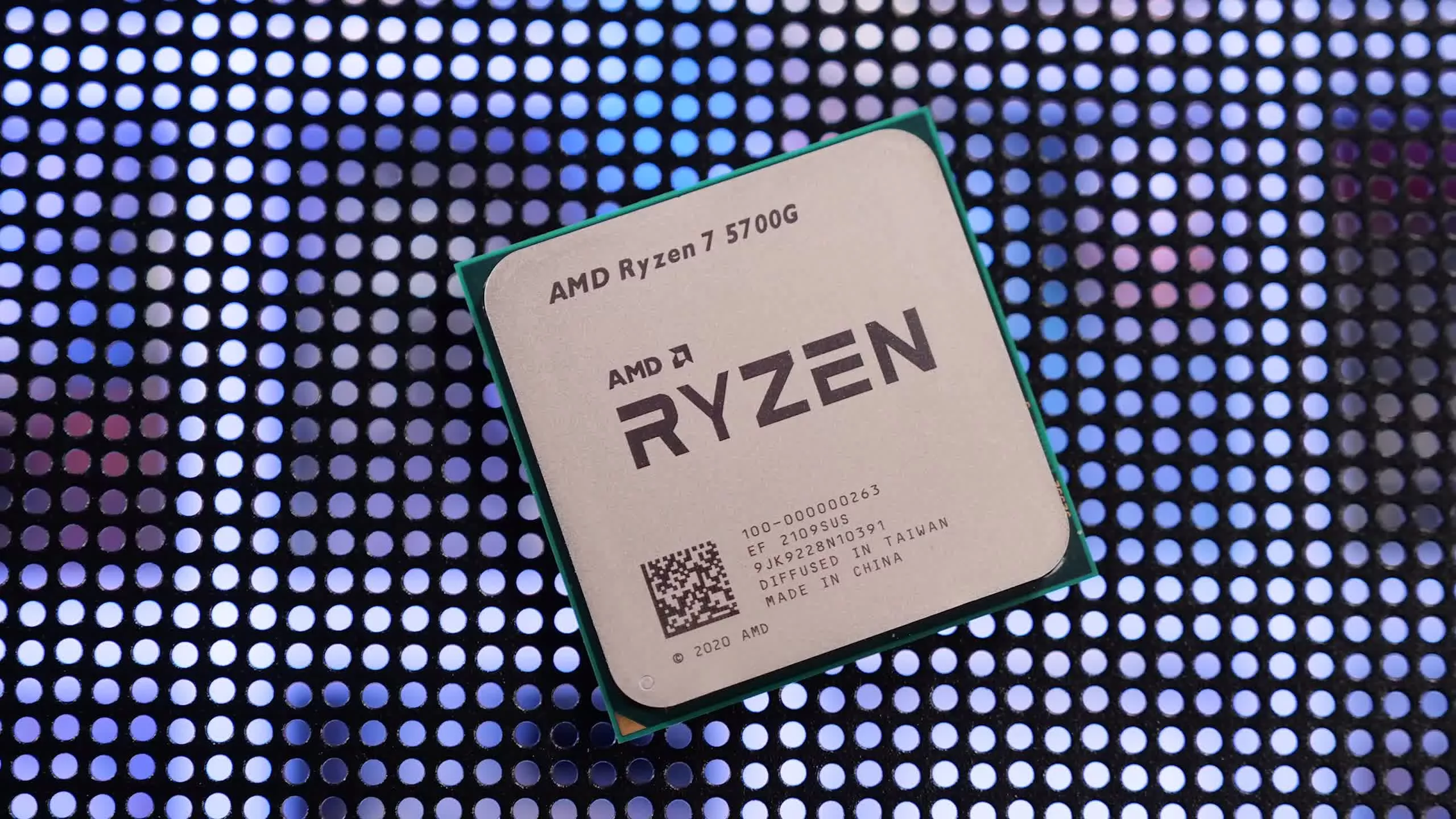Today we're taking a look at the new... or not so new Ryzen 7 5700G. This CPU was released back in April but only for use in OEM systems. Then last month AMD said they would release to the general market alongside the 5600G in August, so next month.
We've been trying to get one of these APUs for a while, but it hasn't been as easy in Australia. Then a few weeks back we found an HP Pavilion desktop PC equipped with the 5700G, so we snapped one up to see what the chip can do. Other reviewers have already tested it since the chip has been easier to find in other regions, but considering we're still 3 weeks away from the retail release, we might as well get testing. We pulled the 5700G out of the HP system, installed it in our AM4 test system and got to it.
But before we get into the testing, let's quickly discuss what the 5700G and 5600G are all about.
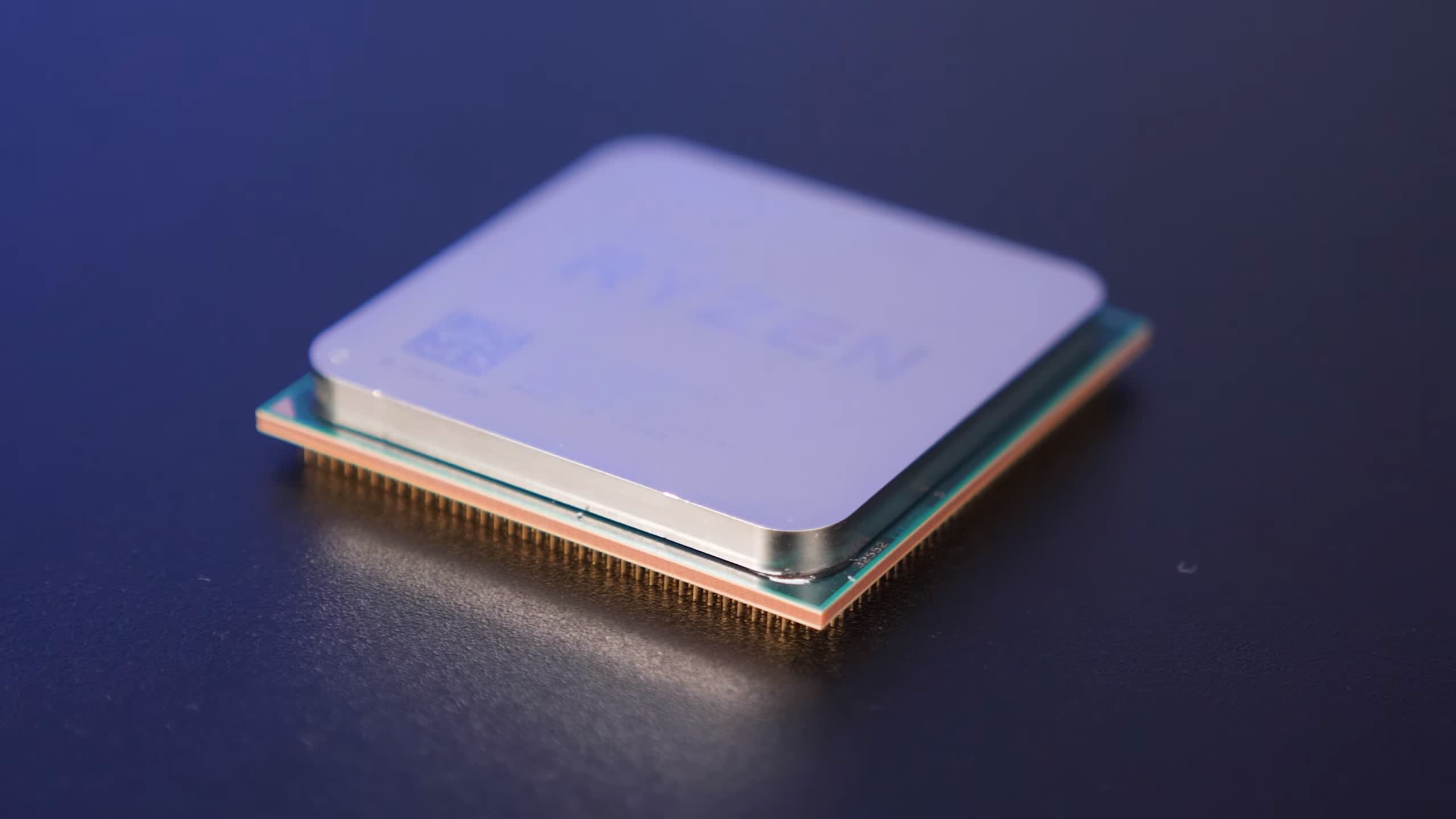
The Ryzen 7 5700G is an 8-core, 16-thread processor using AMD's Zen 3 architecture, clocking up to 4.6 GHz with a 16 MB L3 cache and a 65W TDP. But what makes this chip different to other Ryzen 5000 series parts is the integrated graphics, but sadly it's not RDNA2 or even RDNA graphics, but rather Vega with 8 compute units clocked up to 2 GHz.
This is the same Cezanne die that AMD's using for Ryzen Mobile APUs like the Ryzen 9 5900HX, and that means it's a monolithic die rather than chiplet based. As a result, along with the fact that AMD has to squeeze in the Vega 8 GPU, half the L3 cache has been removed, dropping the 5700G down to 16MB. That's likely going to have quite the negative impact on performance when compared to a part such as the 5800X.
| Ryzen 9 5900X | Ryzen 7 5800X | Ryzen 5 5600X | Ryzen 7 5700G | Ryzen 5 5600G | |
|---|---|---|---|---|---|
| Release | November 5, 2020 | 13 April 2021 | |||
| MSRP $ | $550 | $450 | $300 | $360 | $260 |
| Cores / Threads | 12 / 24 | 8 / 16 | 6 / 12 | 8 / 16 | 6 / 12 |
| iGPU | N/A | 512:32:8 (8 CU) |
448:28:8 (7 CU) |
||
| Base Frequency |
3.7 GHz | 3.8 GHz | 3.7 GHz | 3.8 GHz | 3.9 GHz |
| Turbo Frequency |
4.8 GHz | 4.7 GHz | 4.6 GHz | 4.6 GHz | 4.4 GHz |
| L3 Cache | 32 MB per CCD (64MB Total) | 32 MB | 32 MB | 16 MB | 16 MB |
| TDP | 105 watts | 65 watts | |||
The smaller Ryzen 5 5600G is a 6-core model clocked up to 4.4 GHz, the GPU has also been downgraded to just 7 Vega compute units clocked up to 1.9 GHz, and the same 16MB L3 cache.
AMD is positioning these processors as lower-cost Zen 3 alternatives to the current X-models with no integrated graphics that have been in the market for months now. The company has acknowledged the demand for non-X CPUs and apparently these parts are set to fill that gap.
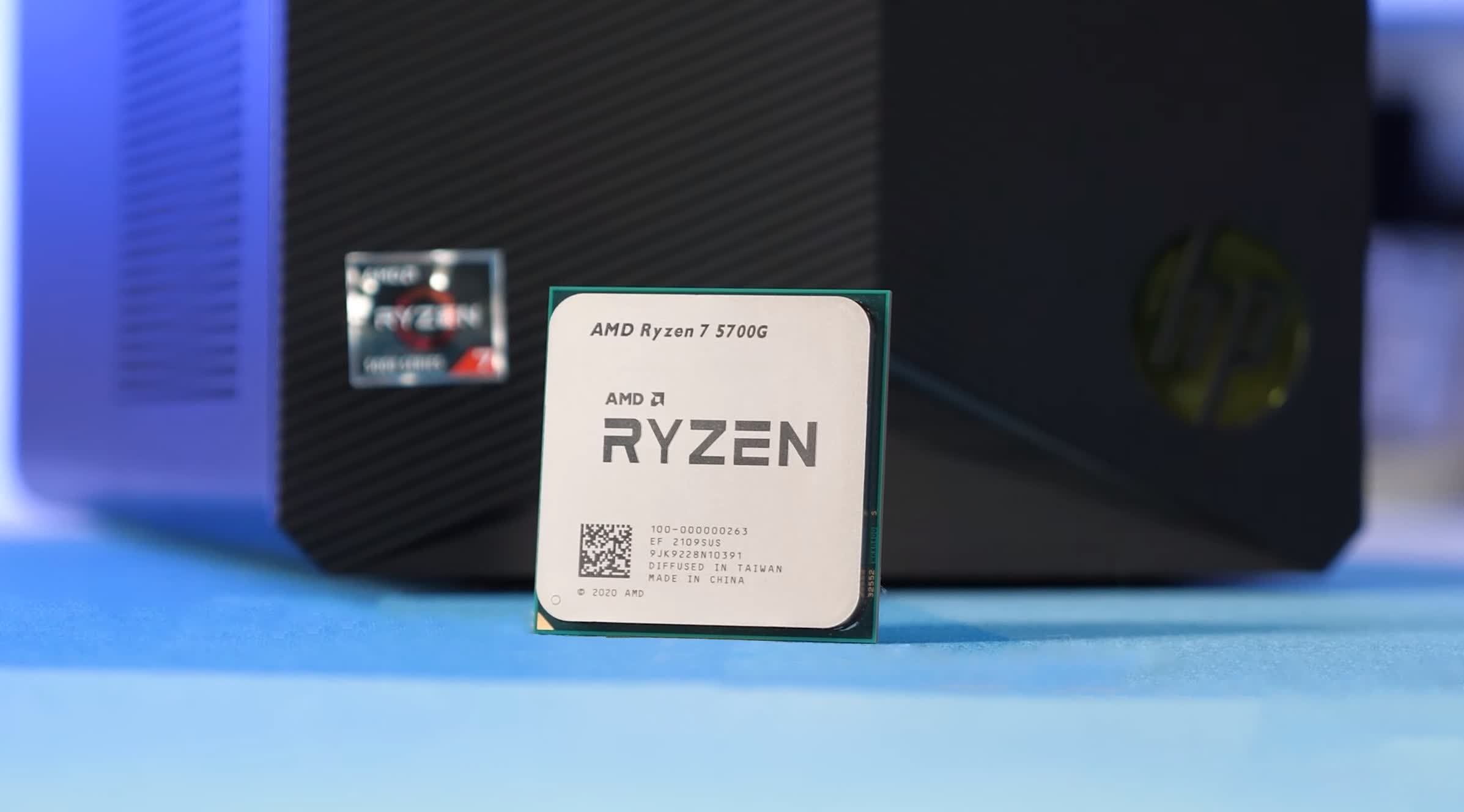
Unfortunately though, these aren't the budget-friendly CPUs many have been hoping for. The Ryzen 5 5600G is priced at $260 – just $40 less than the Ryzen 5 5600X – and not the $200-220 that many people were hoping a Ryzen 5 5600 would slot into.
Meanwhile, the Ryzen 7 5700G will sit between the 5600X and 5800X in terms of pricing at $360, which is not the price point we would have liked, especially with the big reduction in L3 cache and the unfortunate drop of PCIe 4.0 support in favor of the aging PCIe 3.0 standard.

For testing this APU, we've split into three sections. First we're going to look exclusively at CPU performance, but testing the 5700G in applications using an RTX 2080 Ti so I can compare it with the rest of our CPU data. Then I want to see how well it works with the Vega iGPU and for this I'll be comparing it against the Ryzen 5 3400G and the Core i7-11700 using integrated graphics as well as some discrete graphics cards, which were tested on the 5600X.
Finally, we've also run a battery of discrete GPU tests using the GeForce RTX 3090, to compare the 5700G to a range of other CPUs with a powerful graphics card, so that should be interesting and it will give us a good idea of what kind of headroom this APU offers gamers, should they upgrade down the track. So let's get into it...
Application Benchmarks
Starting with Cinebench R20 multi-core we see that the Ryzen 7 5700G is good for a score of 5432 pts, which is quite good, though it is slower than the 5800X and 11900K, trailing by around a 10% margin.
It was around 9% faster than the 10700K, so there is that, but it appears the lack of L3 cache is hurting performance, given that the core count is identical to the 5800X and clock speed is much the same.
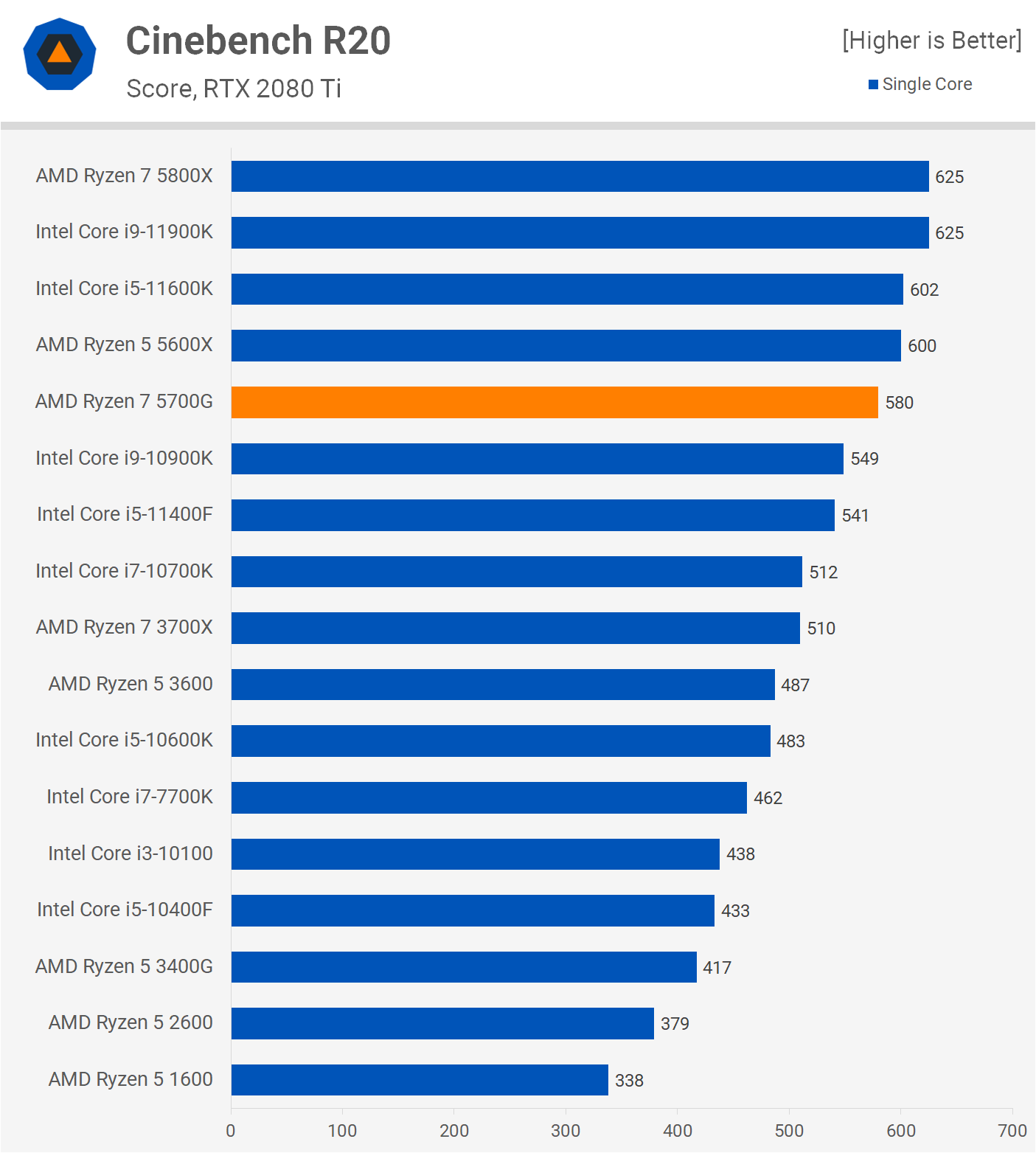
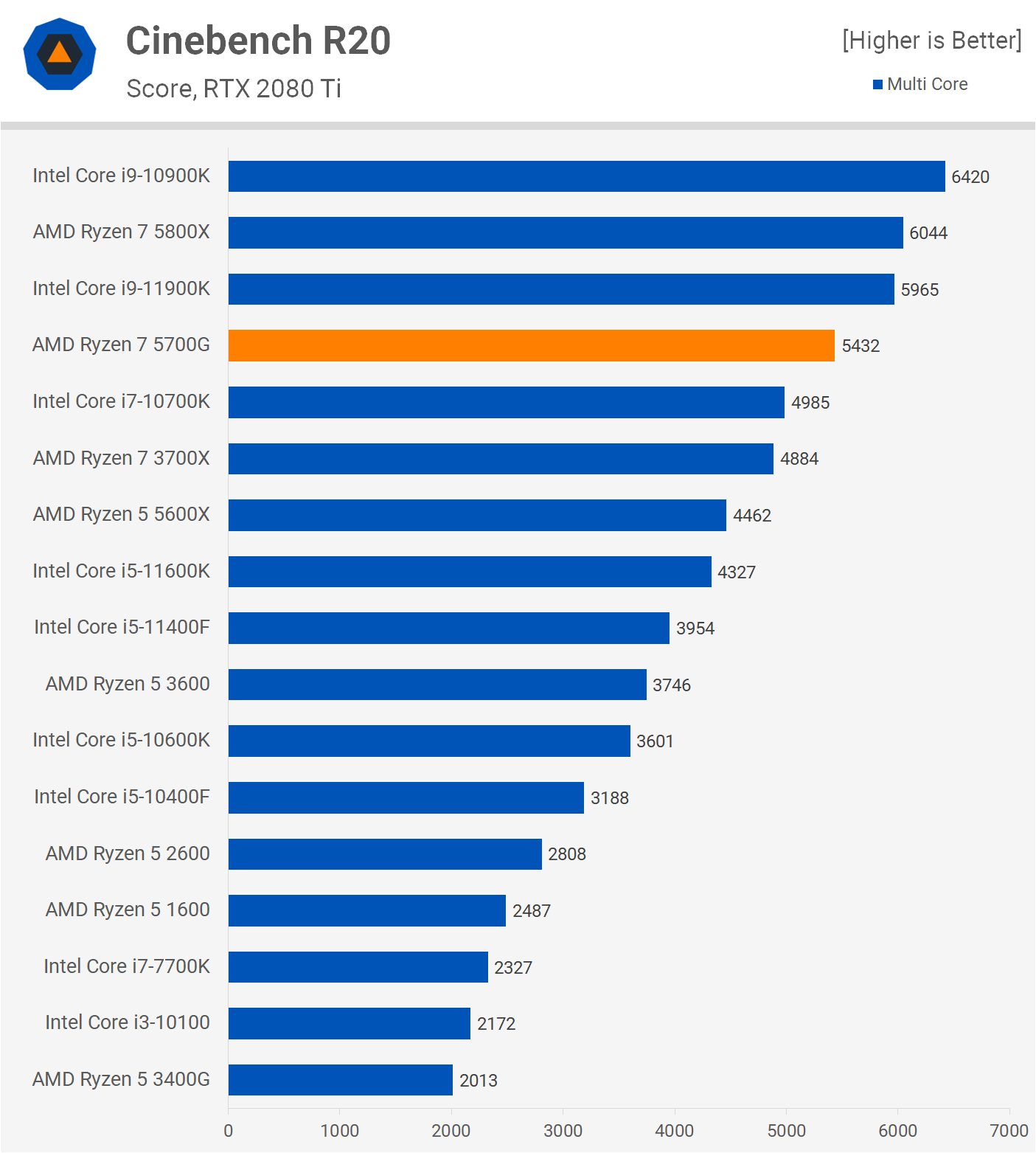
When looking at single core performance, the 5700G is slower than the 5600X, though it's a mere 3% reduction in single thread performance, and when compared to AMD's previous best desktop APU, the 3400G we're looking at a 39% increase in single core performance.
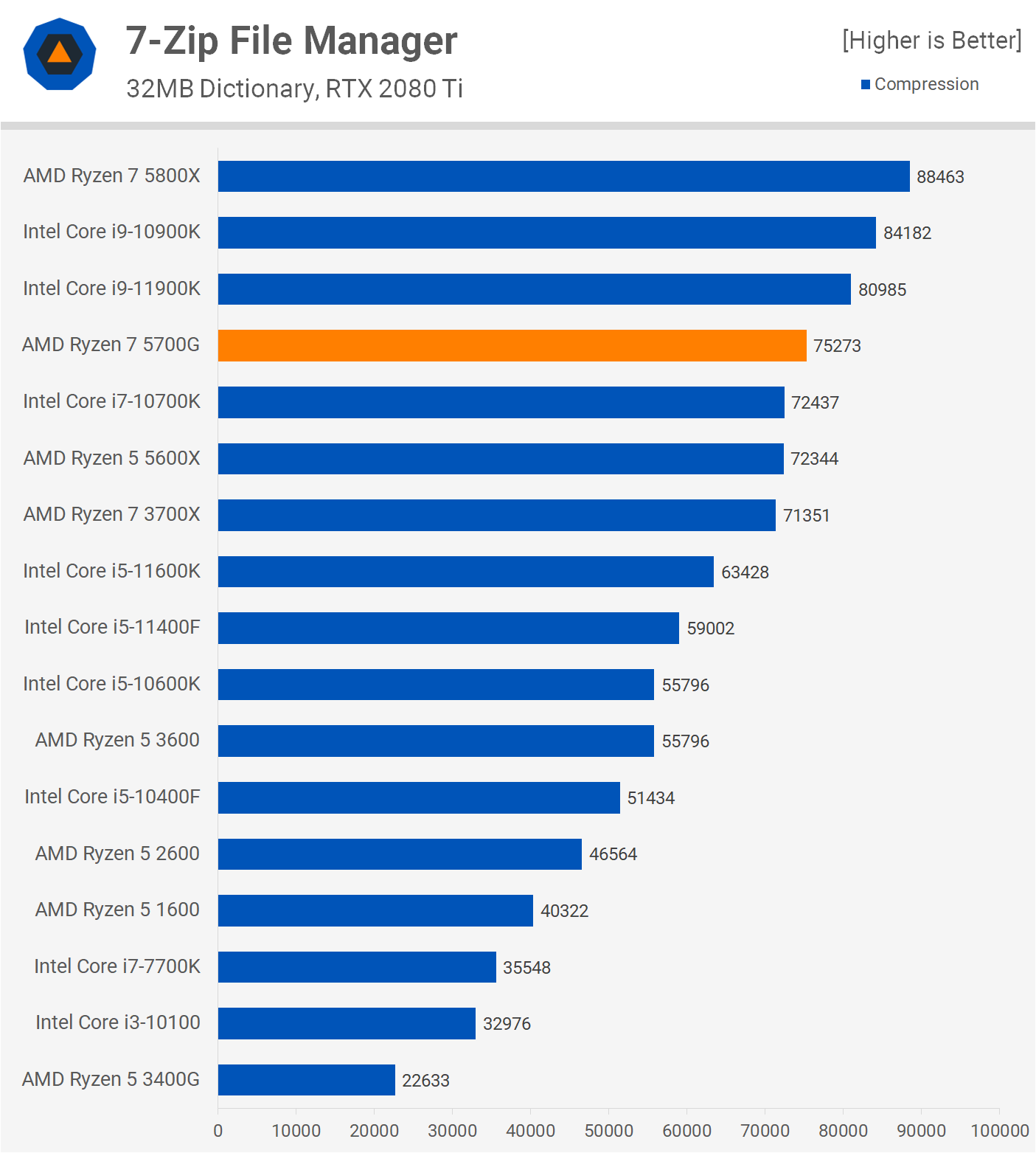
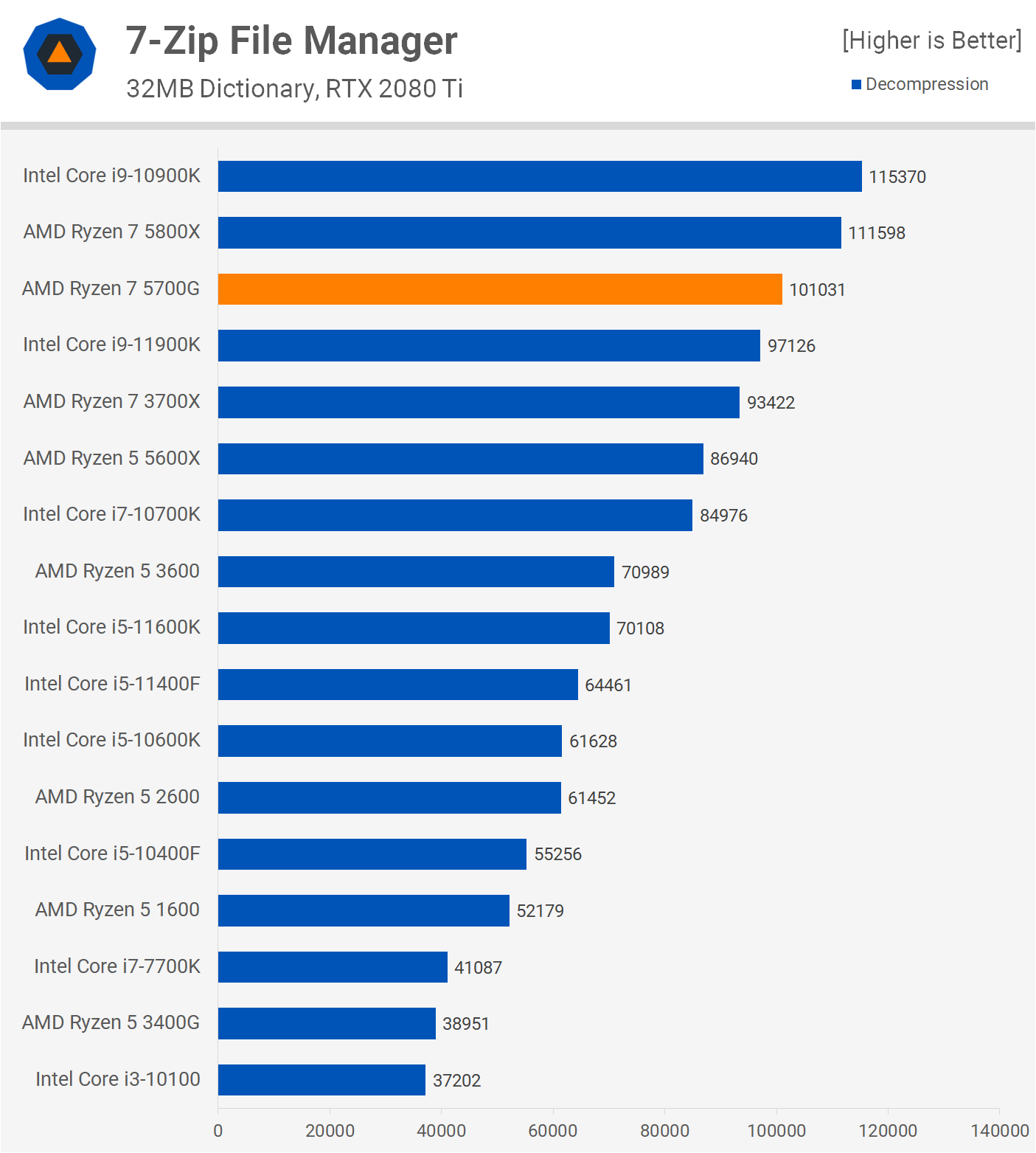
Moving on, 7-zip compression performance is only slightly better than the Core i7-10700K and therefore isn't much better than the 6-core 5600X, or the older 8-core 3700X. So while the performance is respectable, it's not exactly what you might have expected from an 8-core Zen 3 processor.
Compression performance looks a bit better and here the 5700G was 9% slower than the 5800X, which isn't too bad and it was able to outpace the 11900K, so relative to Intel it is a good result.
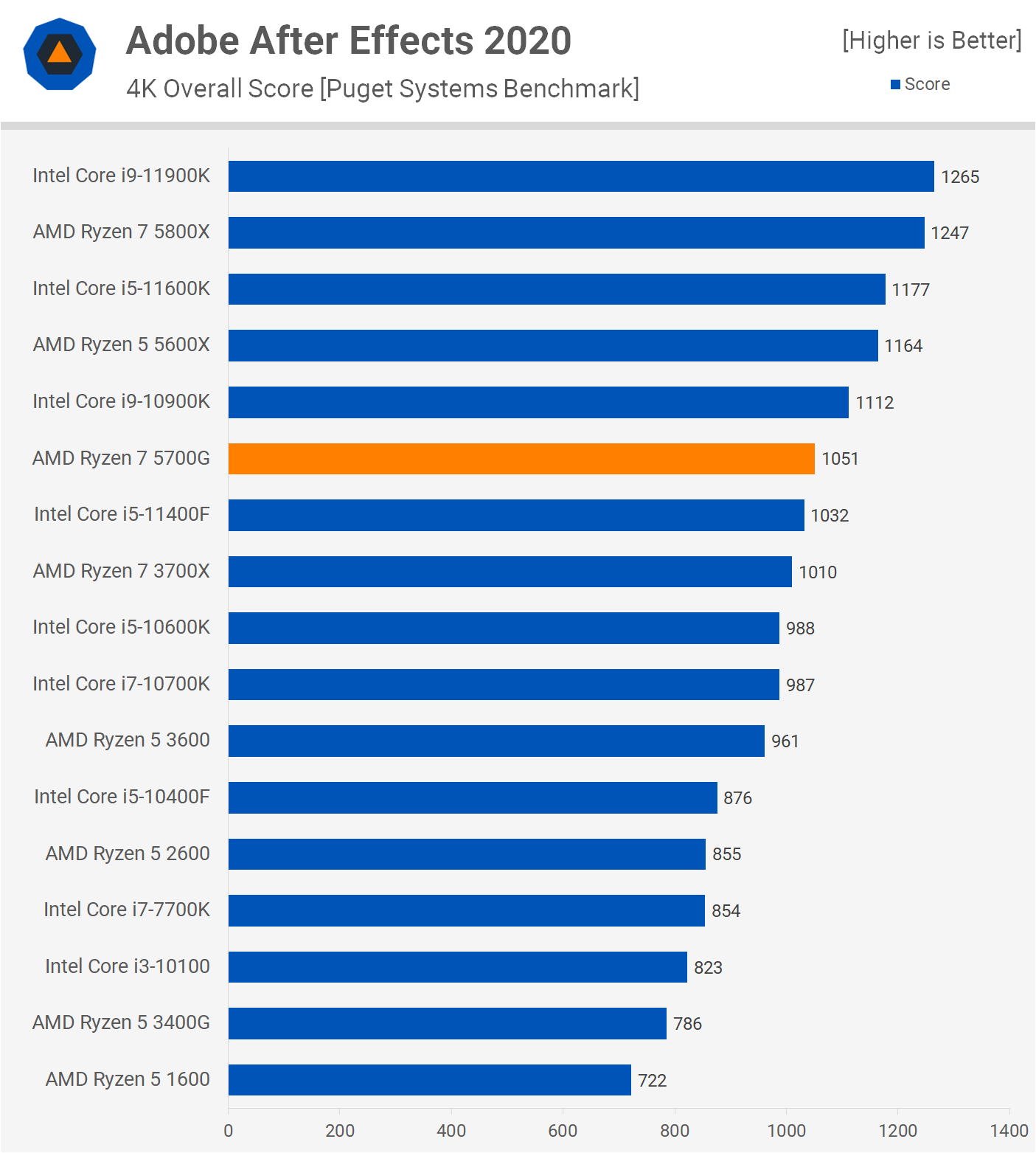
As seen in the Cinebench R20 single thread test, the 5700G is slower than the 5600X, and as a result it trailed the 6-core Zen 3 processor by a 10% margin when testing with Adobe After Effects. In fact, here we're only looking at performance that's roughly equivalent to a Core i5-11400F or Ryzen 7 3700X.
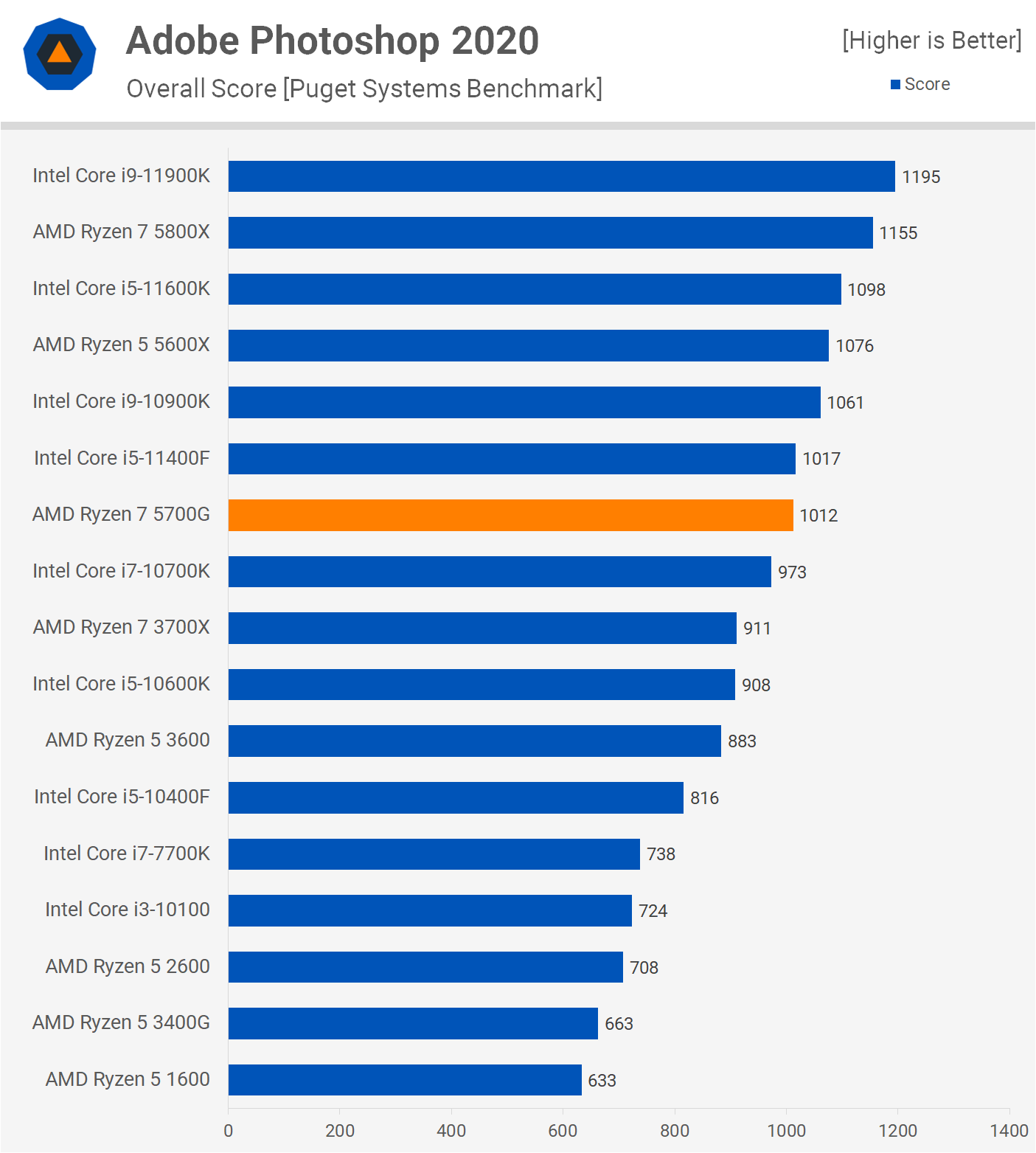
It's a similar story in Adobe Photoshop, the 5700G is only able to match the Core i5-11400F, making it 12% slower than the 5800X and 5% slower than the 5600X.

Then we have Premiere Pro 2020 and here the 5700G was 11% slower than the 5800X as it delivered 3700X/10700K like performance, and that made it more like a 6-core Zen 3 processor, rather than an 8-core model.
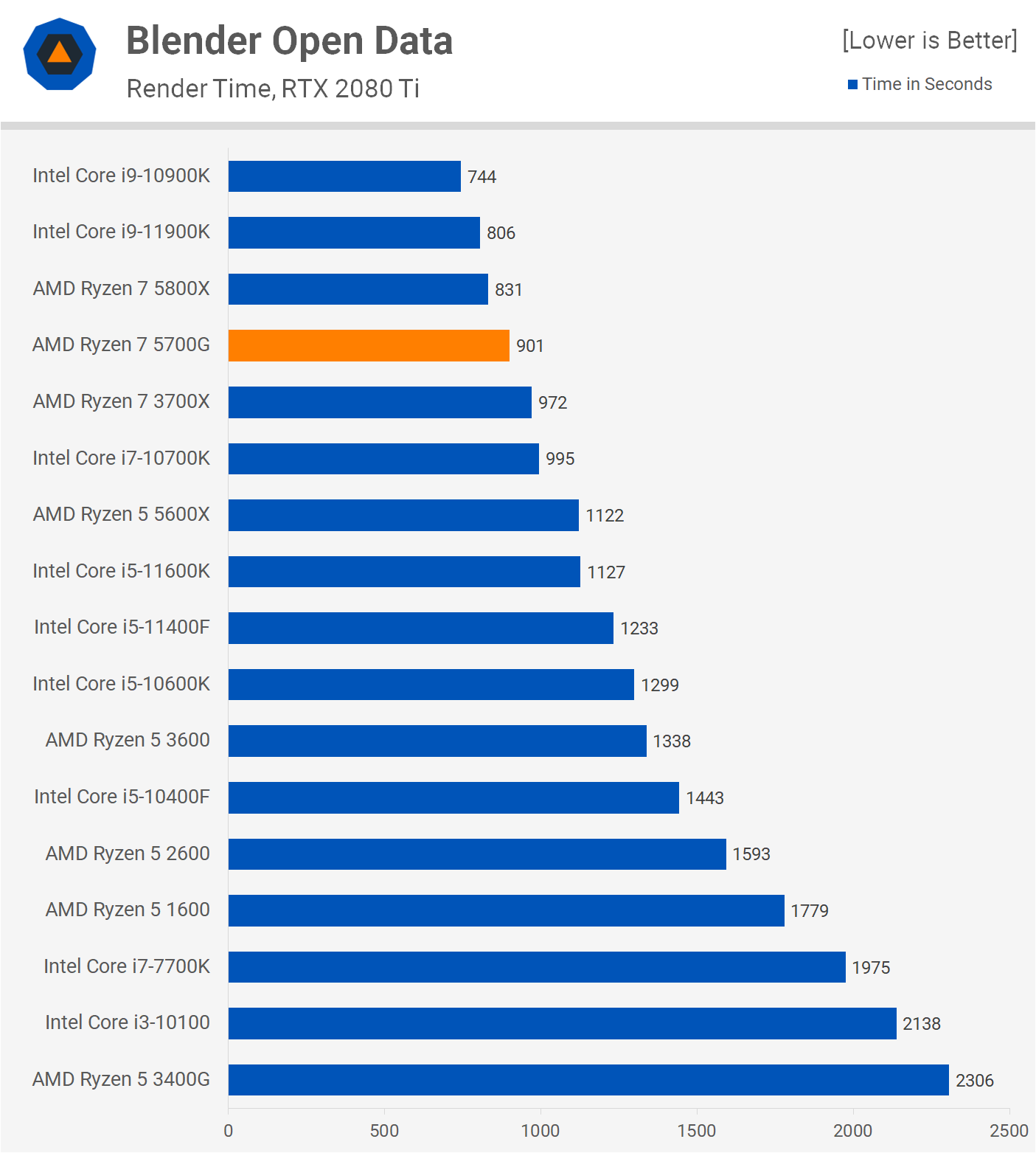
Blender is the last of the application benchmarks and here the 5700G was 8% slower than the 5800X, but almost 20% faster than the 5600X, so a reasonable result.
Power Consumption

We often saw the 5700G delivering 3700X-like performance, and in terms of power usage it's also similar. That means it also matches the 10600K. We're looking at a 15% reduction in total system usage when compared to the 5800X, so overall a good level of efficiency from this 8-core APU.
Integrated Graphics Testing
Time for some integrated graphics testing. For this data we're using the Vega 8 graphics of the 5700G, along with the iGPU in the 3400G and 11700. For comparison we have also added the Radeon RX 550, GeForce GTX 1060 3GB and 6GB versions, as well as the Radeon RX 5500 XT, all of which were tested with the Ryzen 5 5600X.
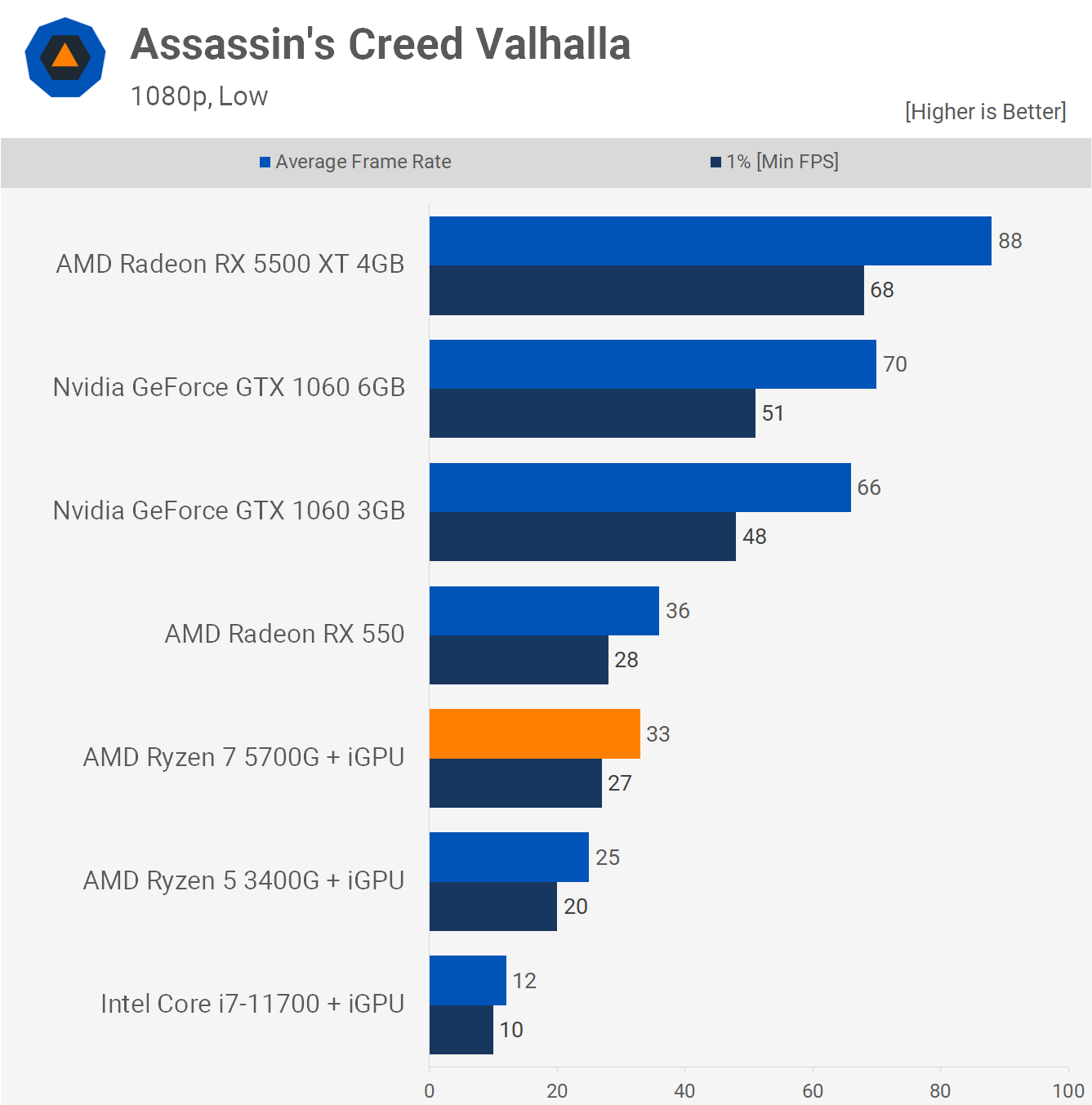
For a modern and demanding title like Assassin's Creed Valhalla, the 5700G's Vega graphics are simply not powerful enough, at least if you want better than a 30 fps experience. Playing at 1080p using the lowest quality settings, and yet the 5700G was good for just 33 fps on average. The only option remaining is to drop down to 720p, and at that point things are getting very desperate.
All that said, the 5700G was 32% faster than the 3400G and... well, a lot faster than the Core i7-11700 and therefore is a better solution than any of the Intel desktop LGA1200 processors when it comes to gaming with the iGPU.
When compared to discrete graphics cards, we're looking at Radeon RX 550/GeForce GT 1030-like performance, so any half decent modern graphics card is going to be miles faster. Take the Radeon RX 5500 XT, for example, which spat out 88 fps on average.
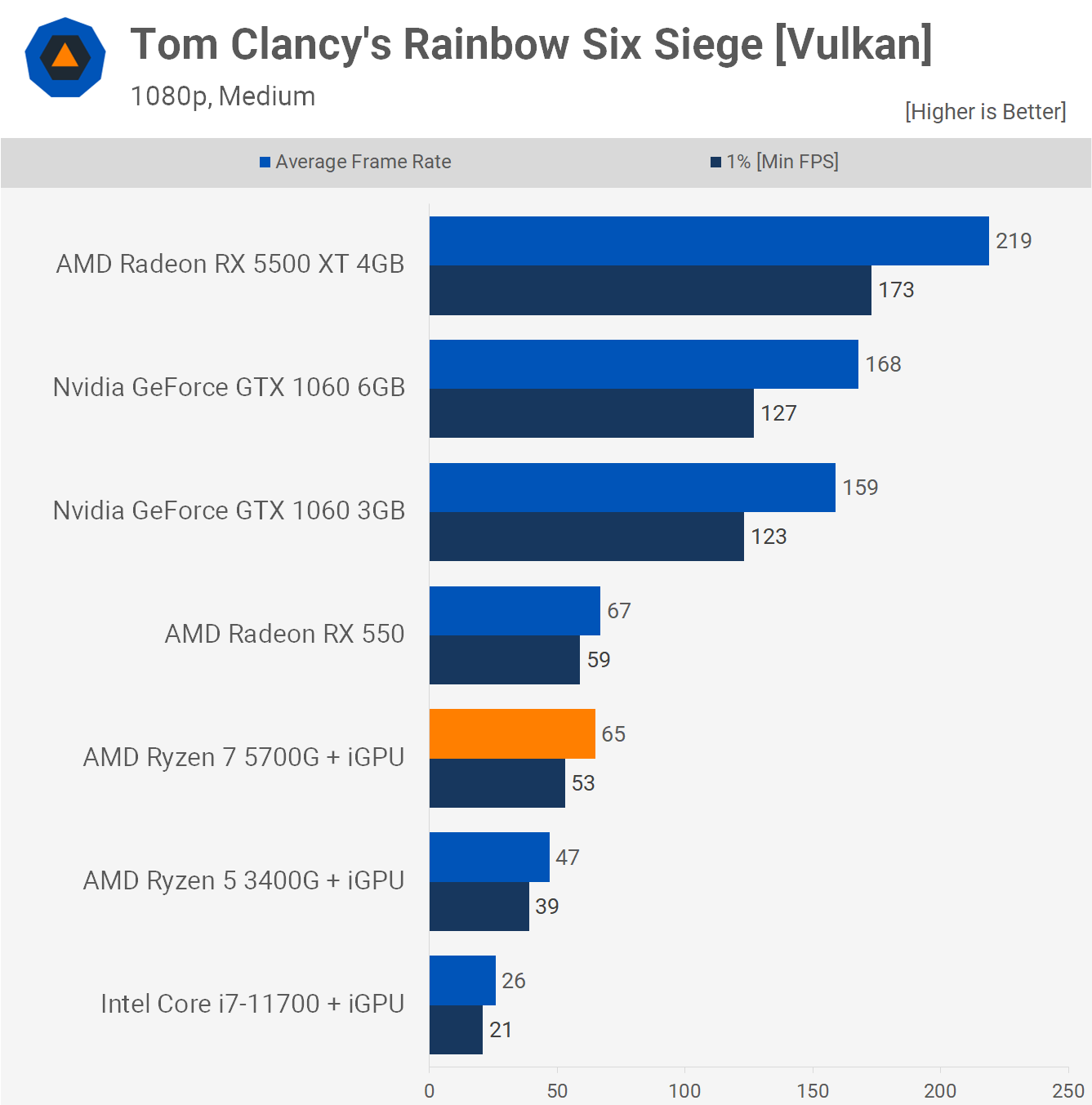
The 5700G is more usable in less demanding games, such as Rainbow Six Siege. Here it was good for 65 fps on average using the medium quality preset.
With low it is possible to keep frame rates above 60 fps at all times. This is roughly equivalent to RX 550 performance, and almost 40% faster than the 3400G which is a big improvement.

Horizon Zero Dawn like Assassin's Creed Valhalla has been tested using the lowest possible quality settings at 1080p, and it's not possible to achieve playable performance with the 5700G, or any of these iGPUs for that matter.
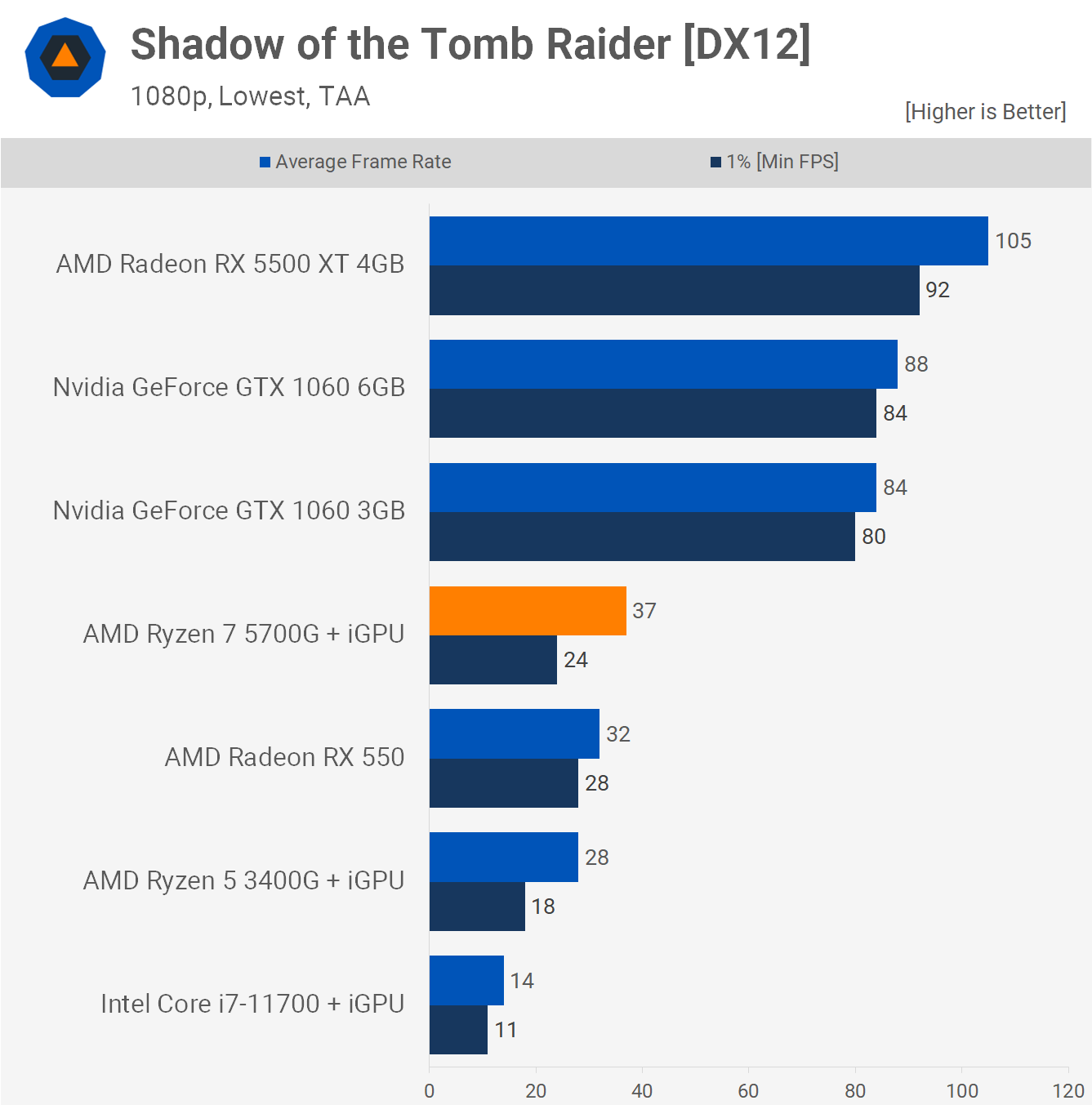
Shadow of the Tomb Raider is a much older demanding AAA title, but again even with the lowest possible quality settings it's not able to achieve playable performance, depending on what you deem playable. The game is technically playable at 37 fps, but it's not exactly an enjoyable experience, at least in my opinion, I'd rather just play an older title in the franchise.
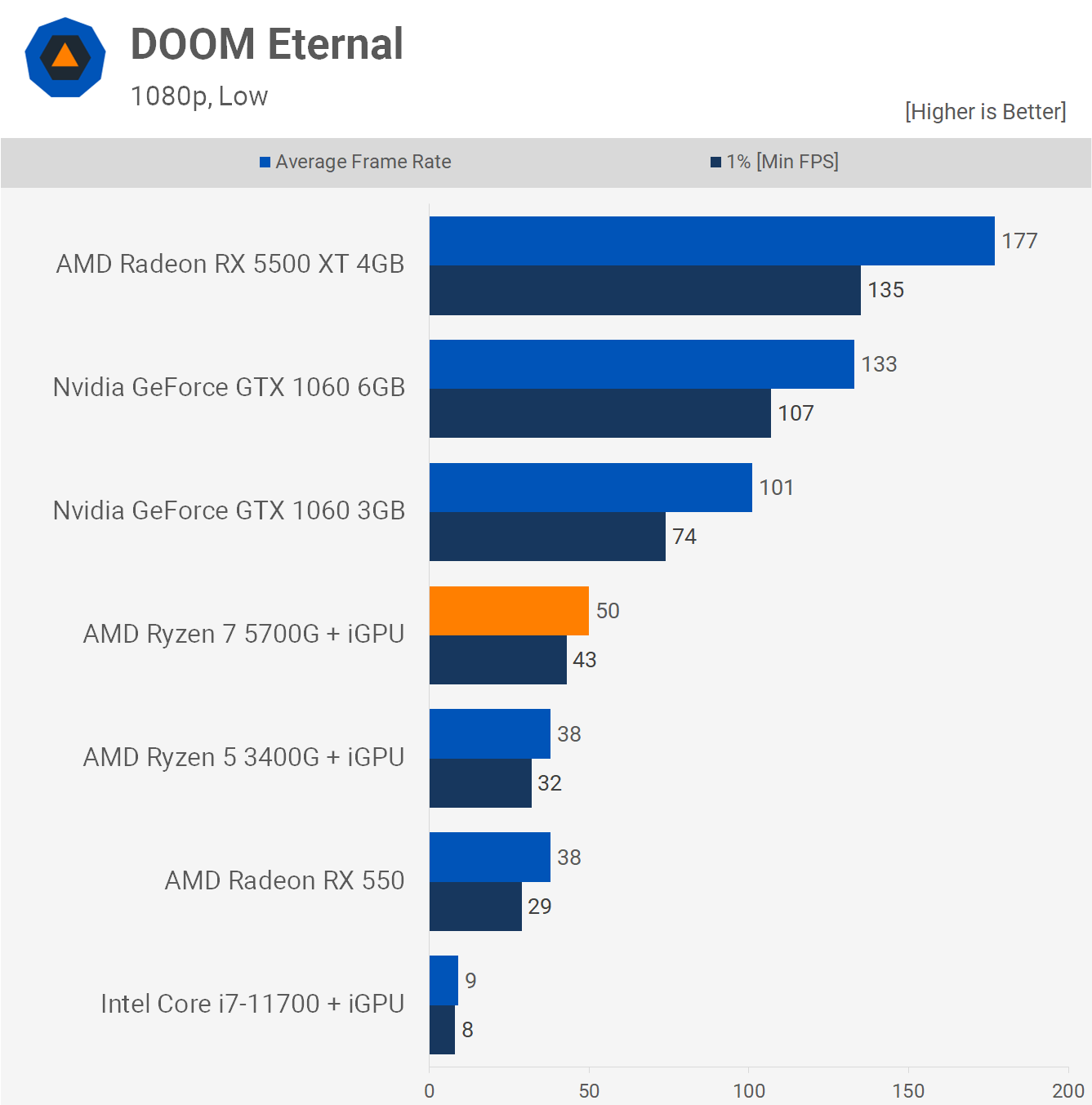
Doom Eternal is playable using the lowest quality settings and the experience wasn't half bad with frame rates staying above 40 fps. This is actually a big deal for the 5700G as the 32% performance increase over the 3400G made the game significantly better to play.
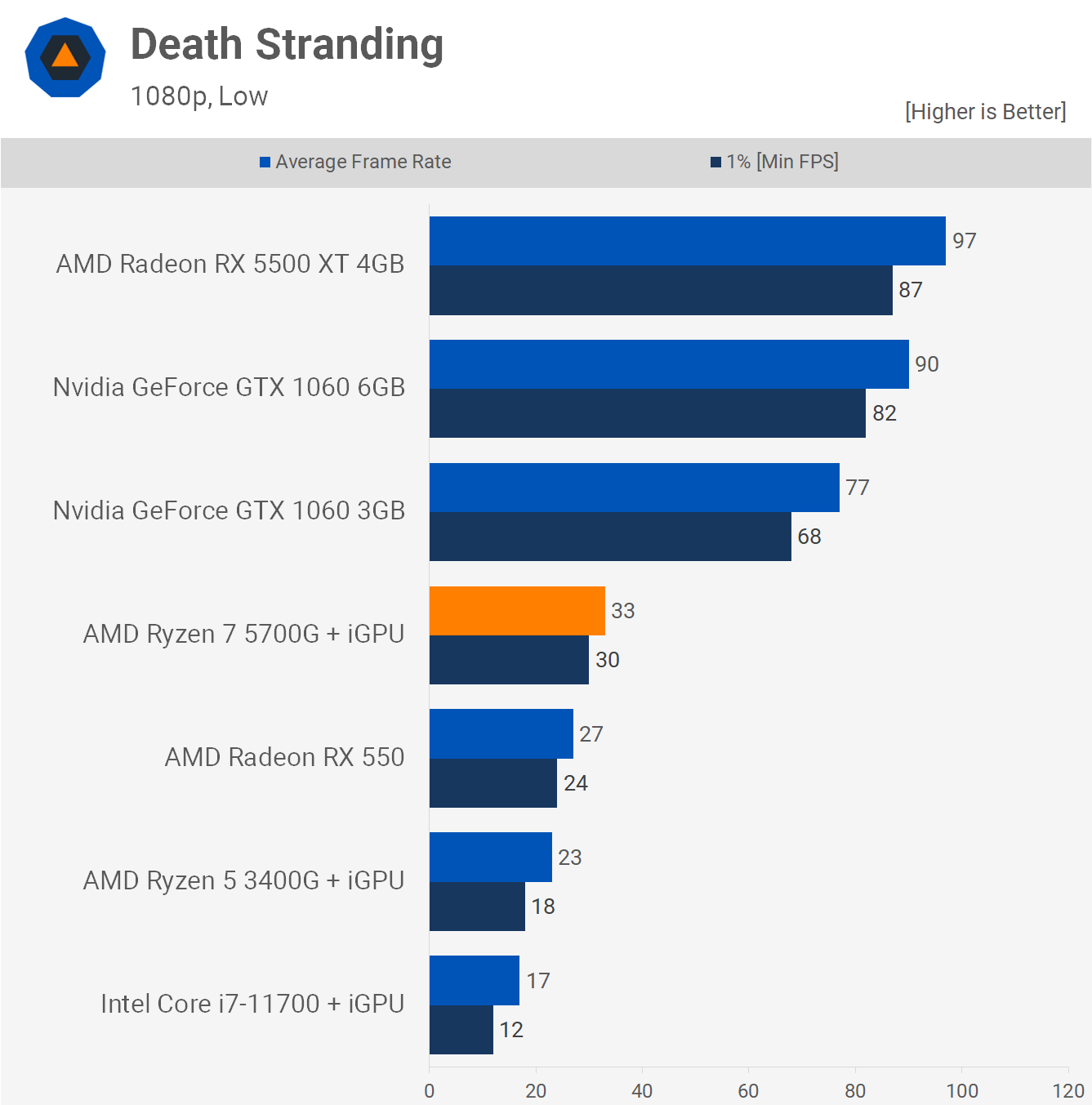
As expected, given what we've seen in other more demanding games, it's not possible to play Death Stranding with the 5700G as frame rates hover around 30 fps. This is a massive improvement from the 3400G, but sadly still not very playable.
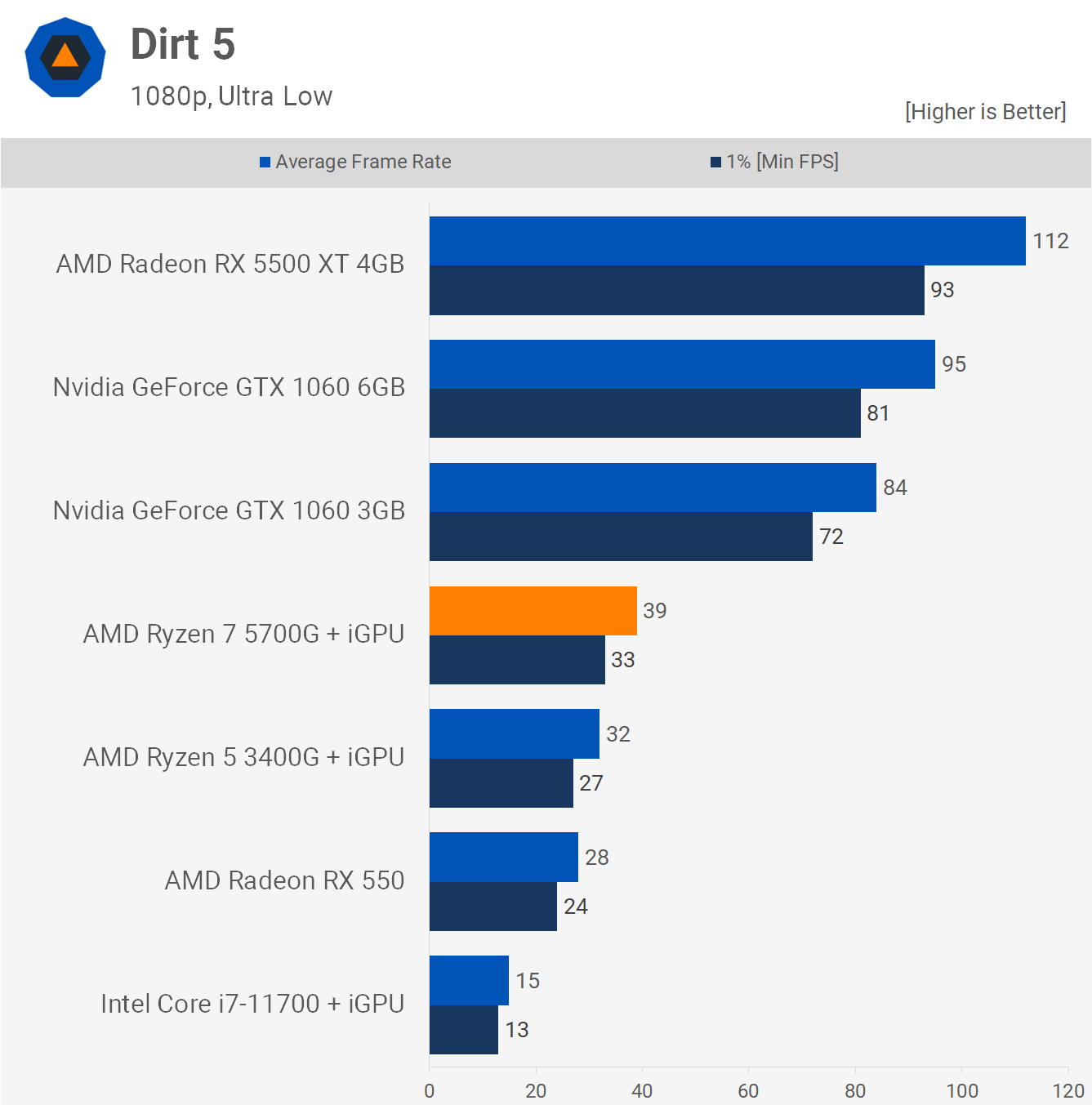
Dirt 5 is somewhat playable with 39 fps on average and a 1% low of 33 fps. This was a 22% increase over the 3400G, but not as impressive in terms of gains as what we've seen in other titles.
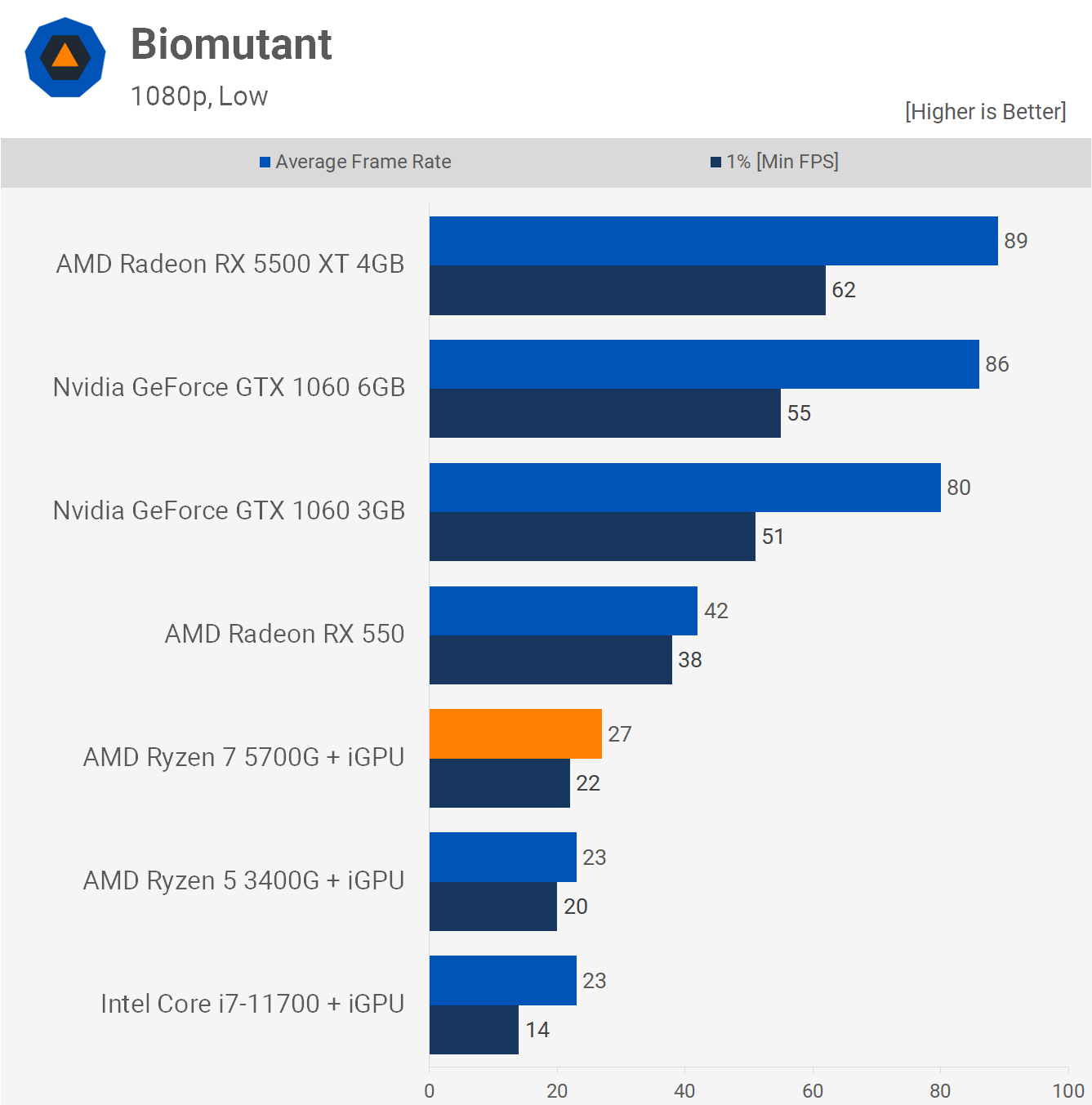
Biomutant is another new game that you can't run on the 5700G at 1080p, at least not at satisfactory frame rates. Here we're looking at 27 fps on average and interestingly that's significantly down on the RX 550.
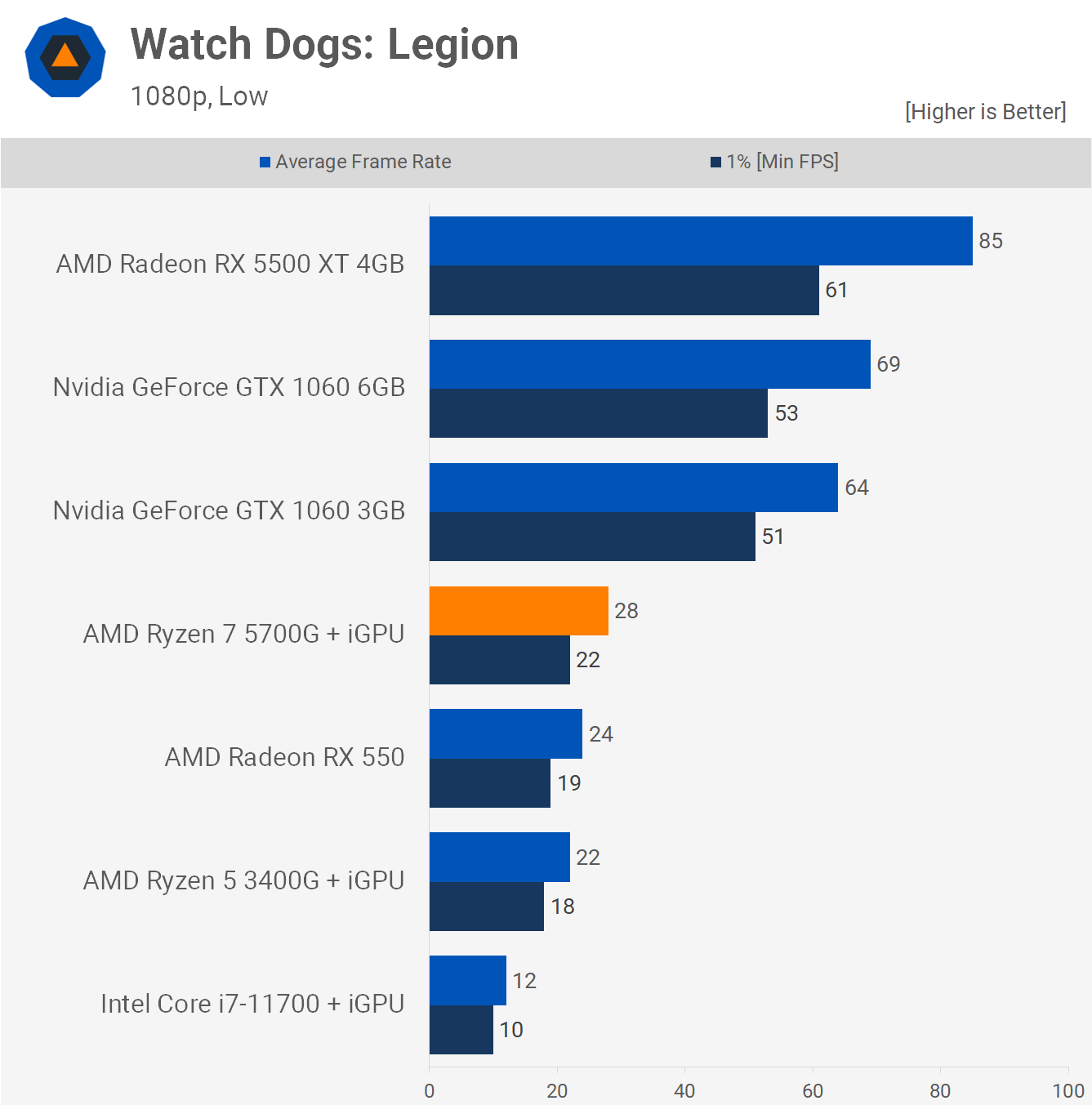
Watch Dogs: Legion also can't be played at 1080p despite using the lowest quality settings, here we're looking at just 28 fps on average, so the game wasn't playable.

Outriders using the lowest possible quality settings at 1080p is not playable with the 5700G and oddly wasn't any faster than the 3400G. I suspect this is related to a driver issue and perhaps we saw the same thing in Biomutant.

However, a game you can comfortably play is Counter-Strike: Global Offensive, here the 5700G managed 112 fps on average which is a 35% increase over the 3400G and pushed us into high refresh rate territory, which is pretty impressive. This is over twice what you'll get out of the 11700 or other 11th-gen Core series processor.
It's worth noting that this performance was achieved using the medium quality settings, so you can increase frame rates by dropping to low if you wish.
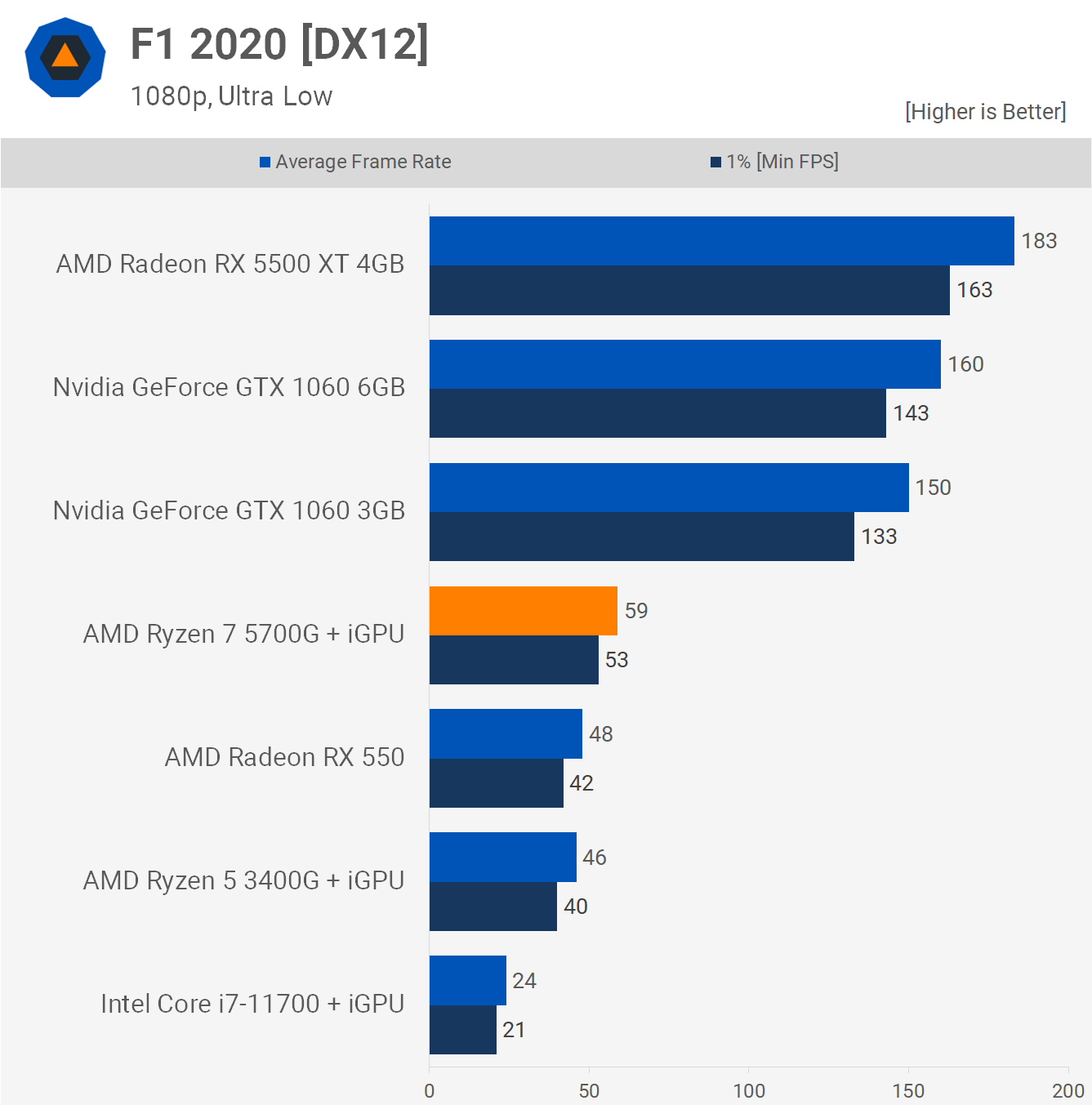
It was also possible to get ~60 fps on average in F1 2020 at 1080p using the lowest quality settings and this 28% performance increase over the 3400G was very noticeable and did lead to a better gaming experience.

Finally we have Dota 2, which has been tested using the highest quality settings and here the 5700G was good for 73 fps on average, a 33% performance boost over the 3400G.
Dialling down the quality settings will net you significantly more performance in Dota 2, especially given the CPU side of things is very powerful with the 5700G, so 1440p gameplay is possible here.
Gaming Benchmarks (dGPU)
For testing gaming performance using a discrete graphics card, we picked the GeForce RTX 3090 and started with F1 2020. Here the 5700G is comparable to Intel's previous generation 8-core processor, the Core i7-10700K. When compared to the 5800X, it is 6% slower, which is not much but goes to show that halving the L3 cache has reduced performance.

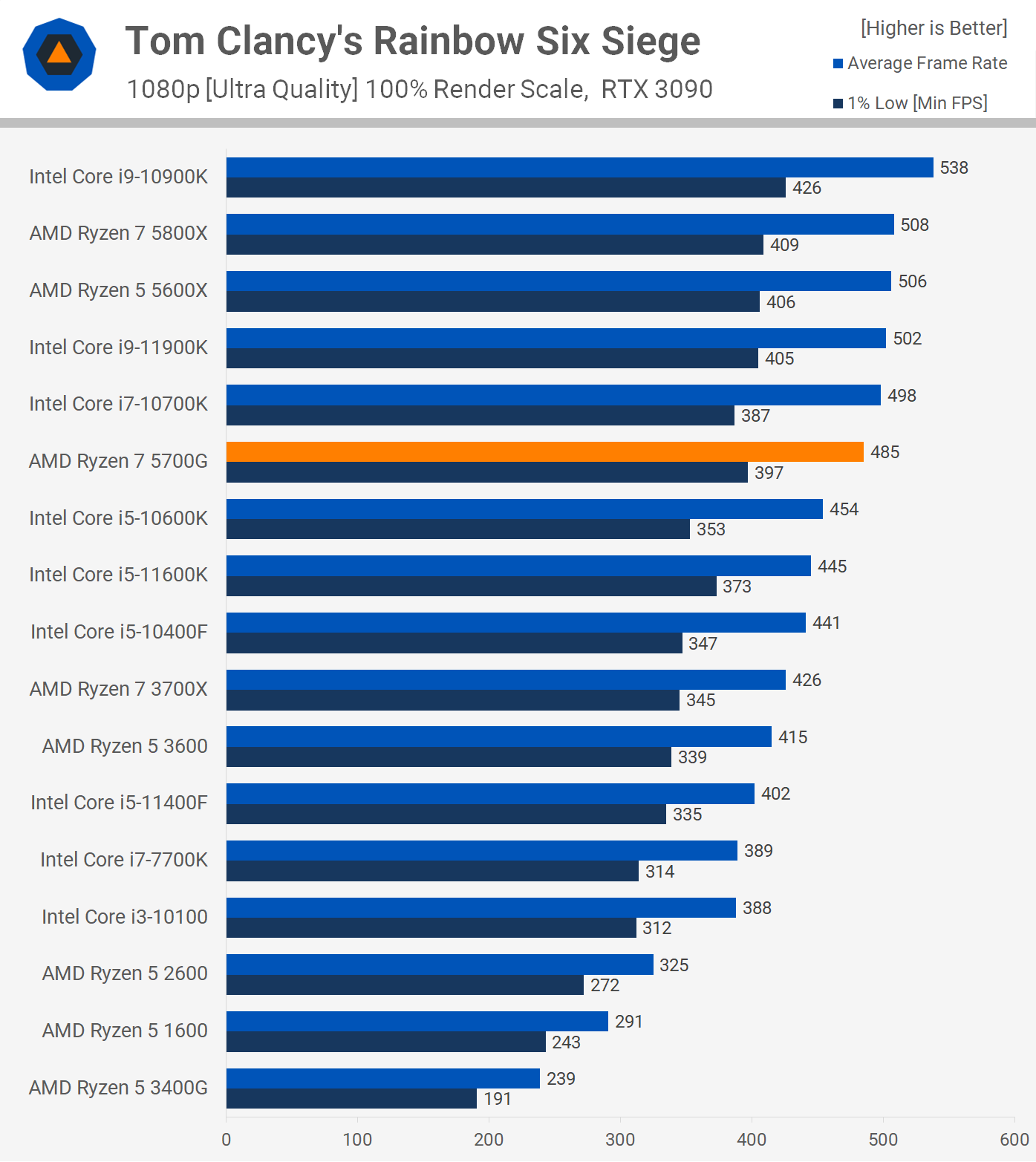
The 5700G was slightly slower than the 5800X when testing with Rainbow Six Siege, but we're talking about a small 4% margin and the APU was good for 485 fps, so that's pretty good. That said, as far as 8-core CPUs go, it was slower than 10th and 11th-gen Core parts and only 7% faster than the 10600K.
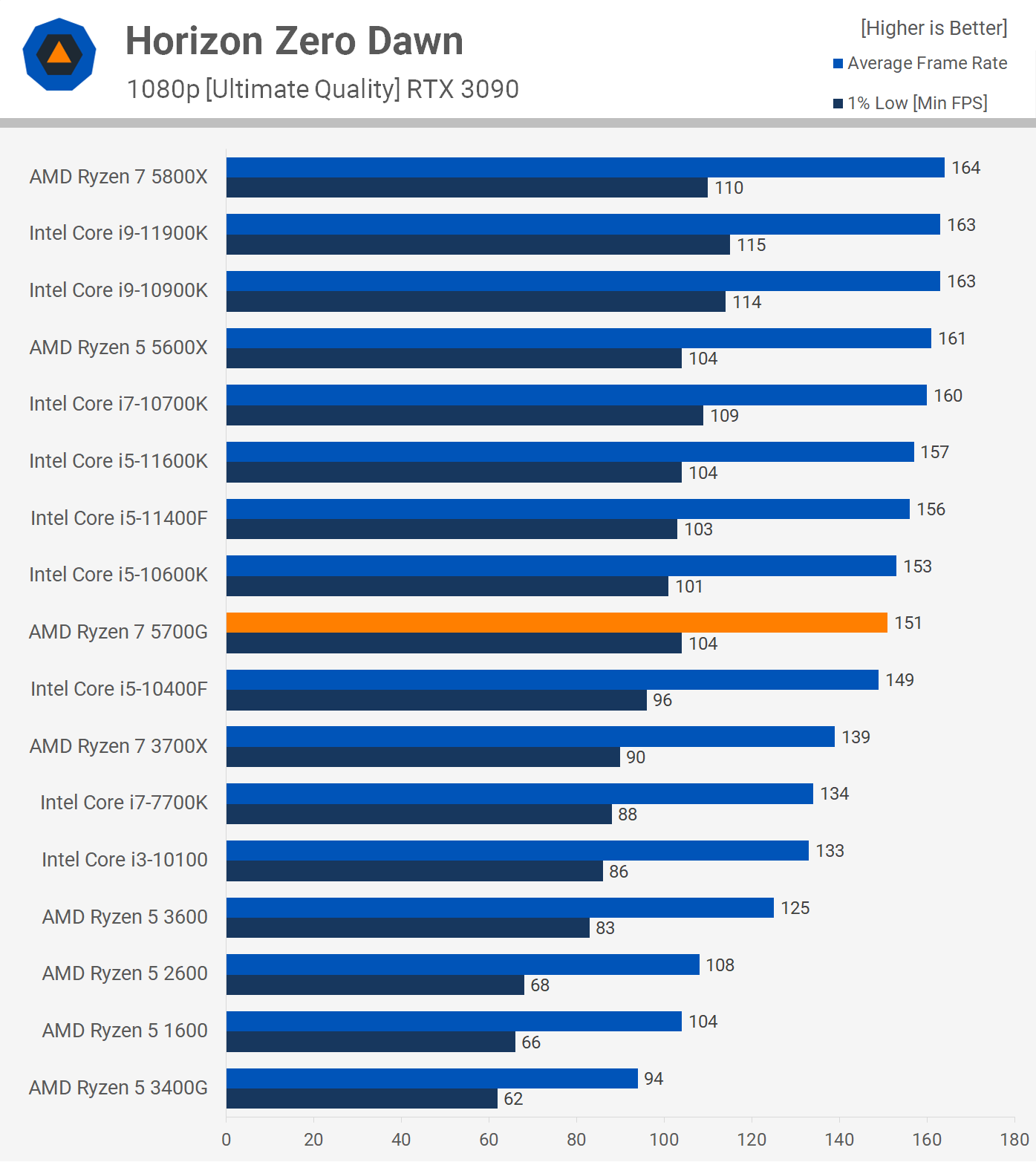
Next up we have Horizon Zero Dawn and here the 5700G was 8% slower than the 5800X, delivering 10600K-like performance with 151 fps on average. This remains a good result in the grand scheme of things, despite being the slowest Zen 3 CPU we've seen.
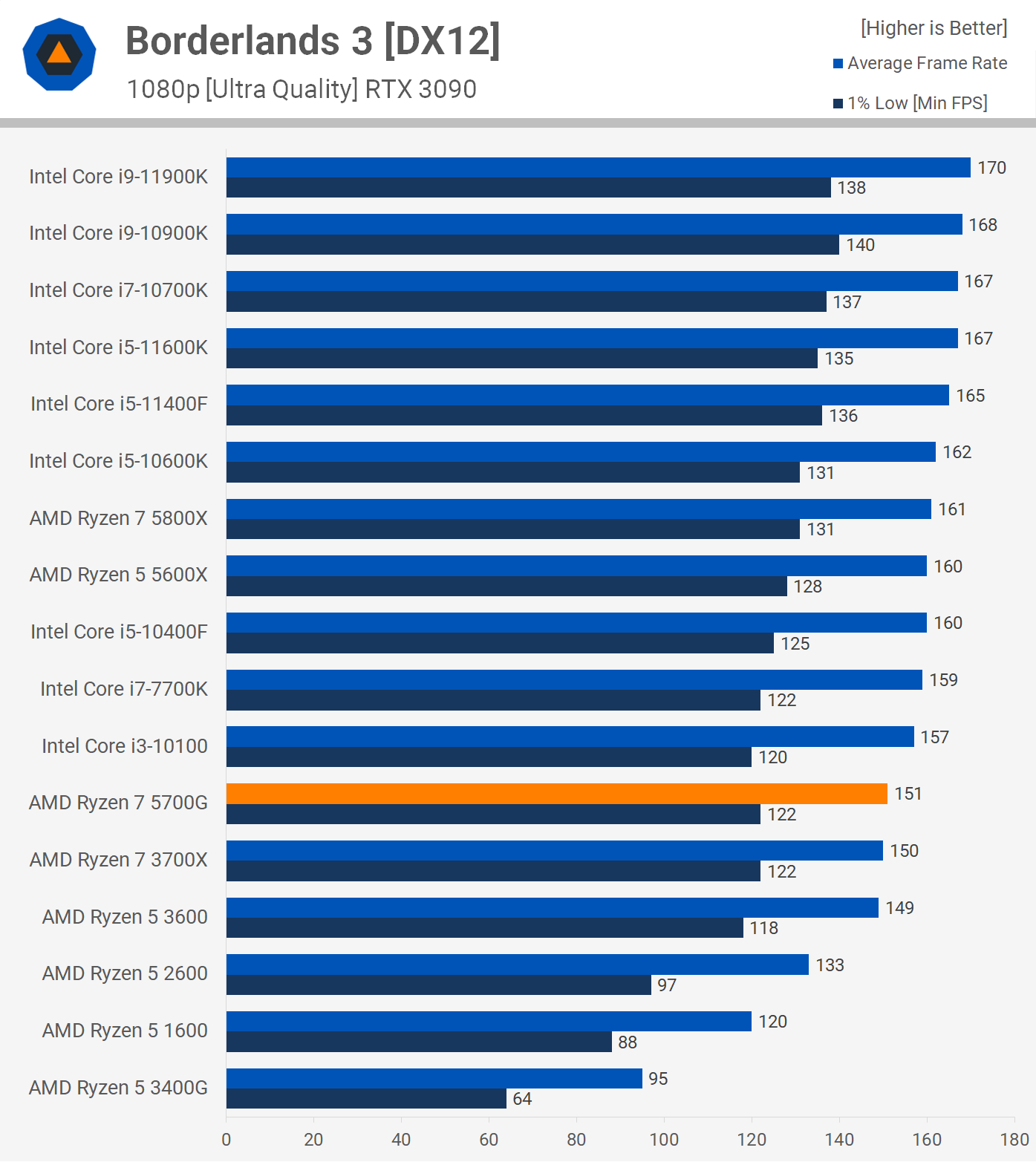
The 5700G did struggle a little in Borderlands 3, averaging 151 fps and mirroring the performance of the 3700X and 3600, which is a bit disappointing. It was also slower than the Core i3-10100, Core i7-7700K and a range of other CPUs, though it's worth noting that this isn't a strong title for Ryzen, so the 5700G was only 6% slower than the 5800X.
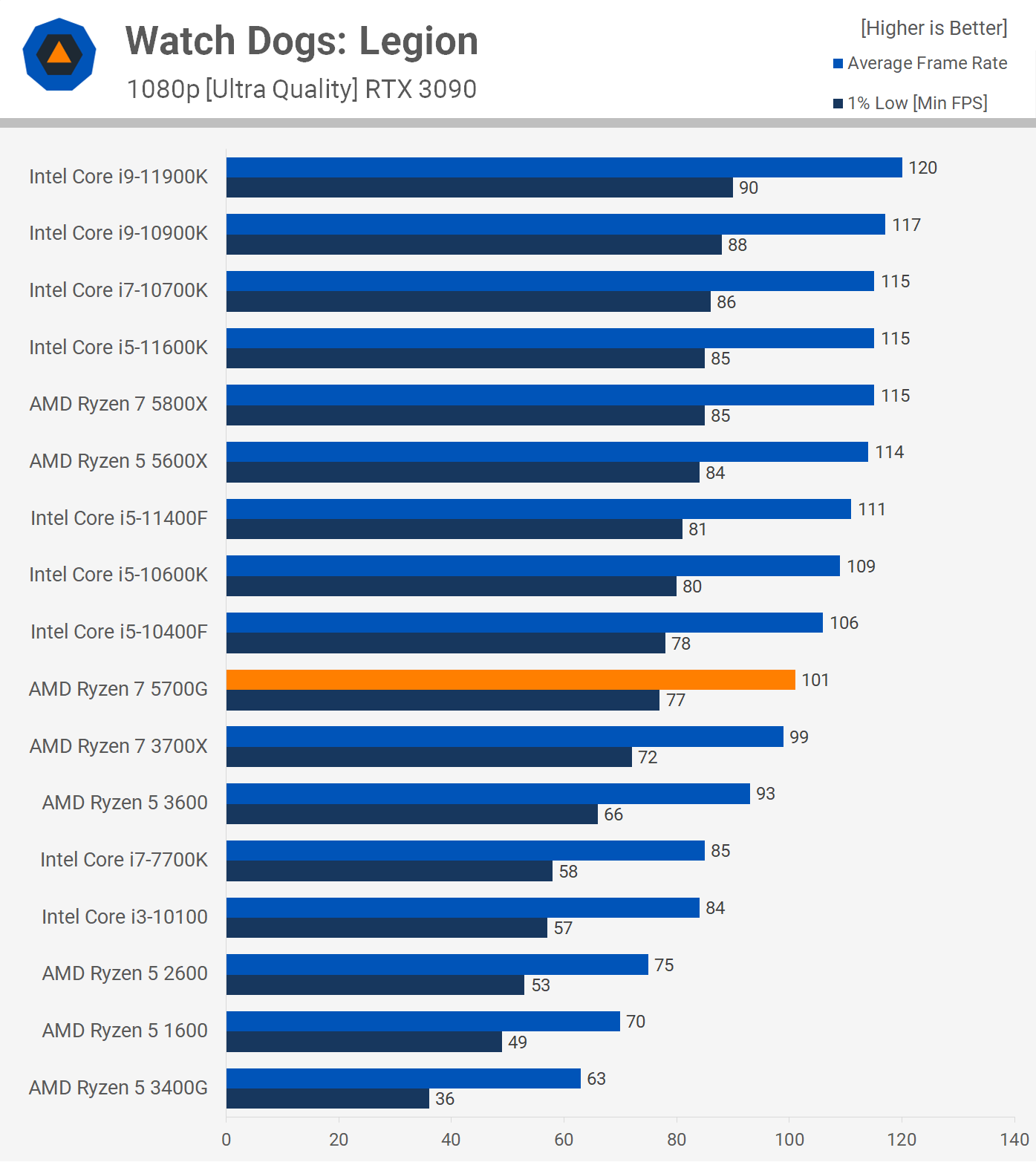
The margin to the 5800X widened in Watch Dogs Legion. Here the 5700G was 12% slower rendering 101 fps on average, and once again that meant it was delivering 3700X-like performance, making it slower than 6-core 10th-gen Core series processors.
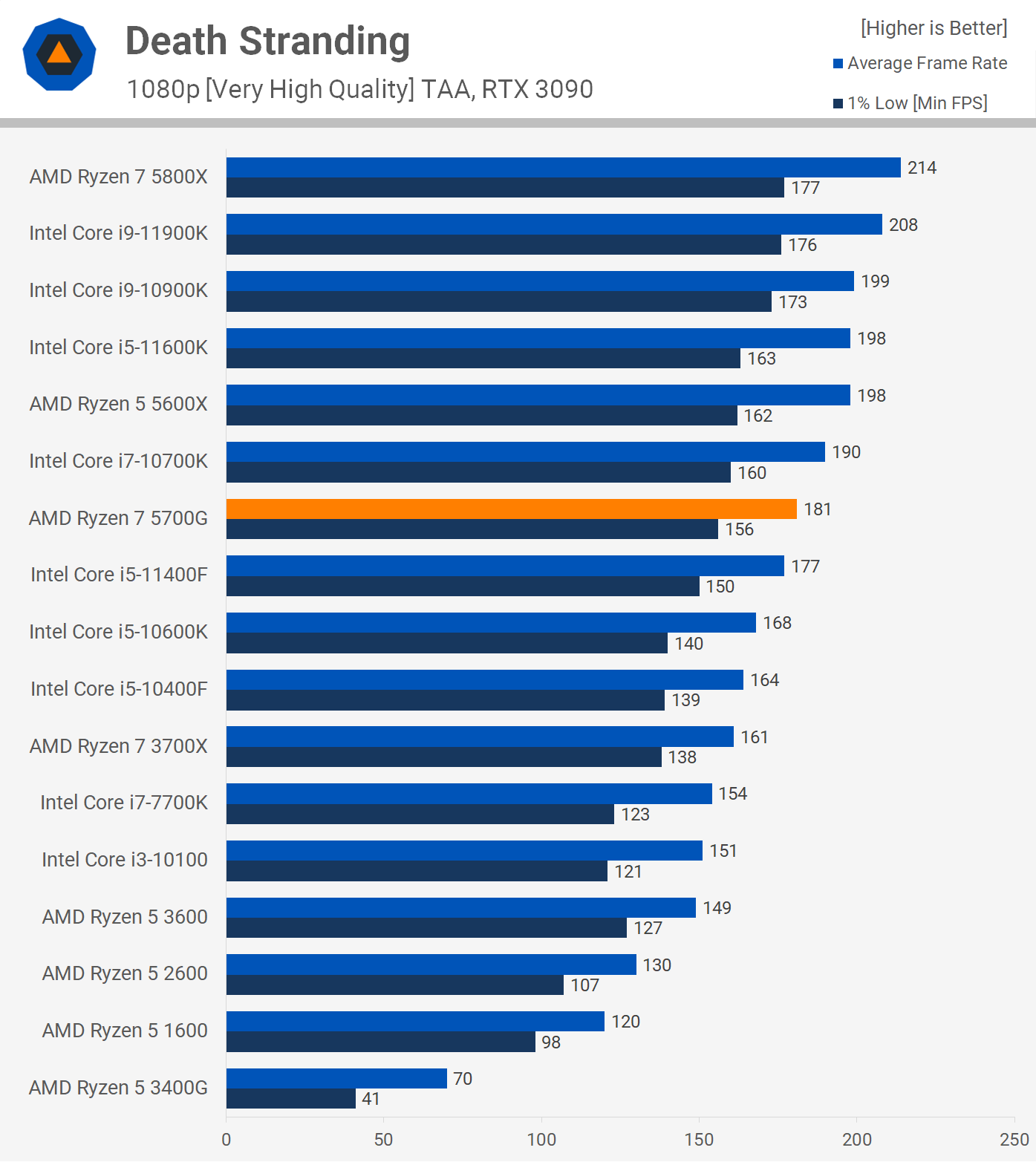
Death Stranding benefits a lot from the massive L3 cache of the Zen 3 chiplet CPUs as here the 5800X allowed for 214 fps, making it the fastest CPU tested. The 5700G was 15% slower dropping to i5-11400F territory, though it was still 12% faster than the 3700X.
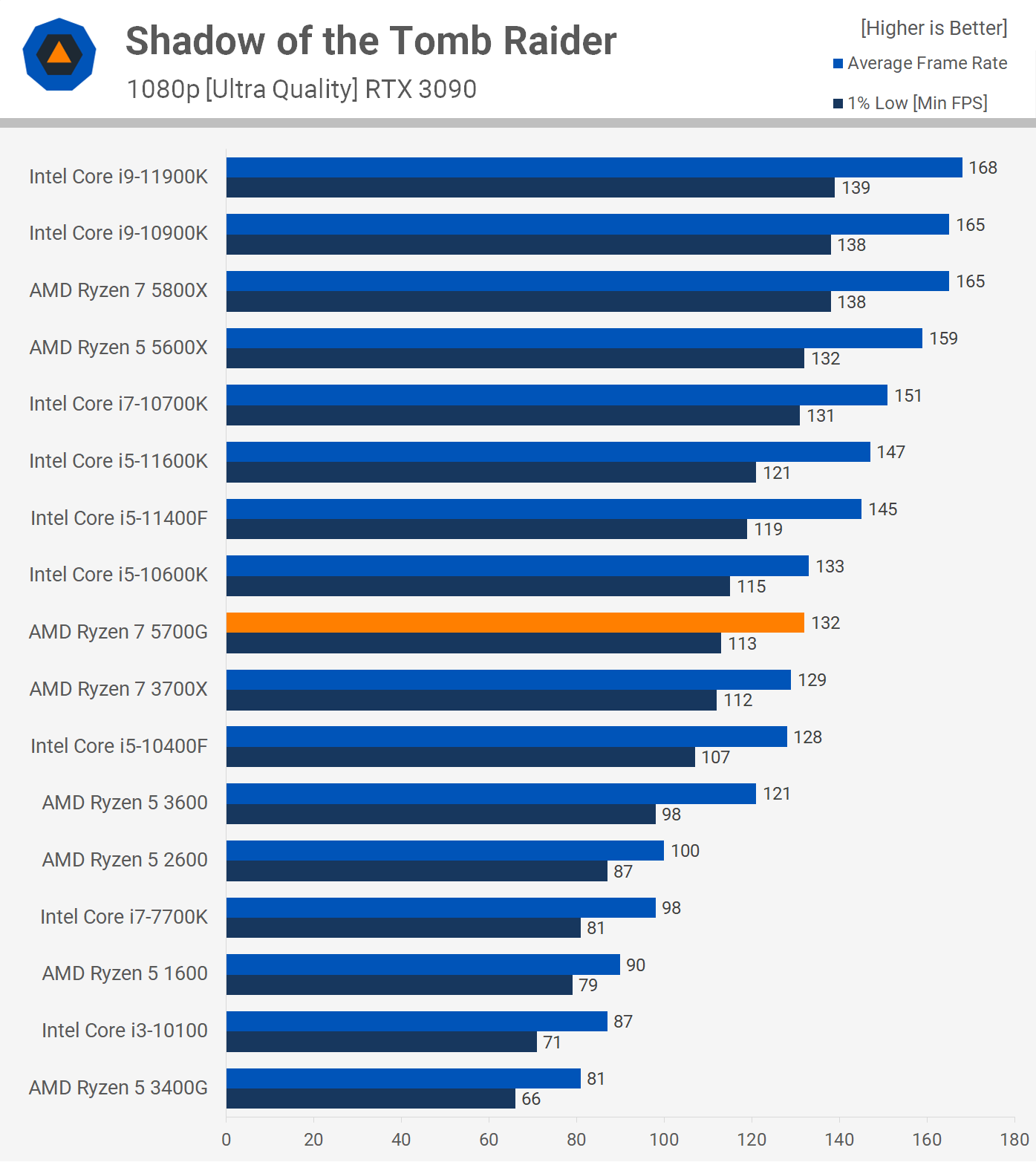
Interestingly, we saw a big 20% decline in performance for the 5700G when compared to the 5800X, and that meant it was good for just 132 fps on average, again delivering Ryzen 7 3700X and Core i5-10600K-like performance.
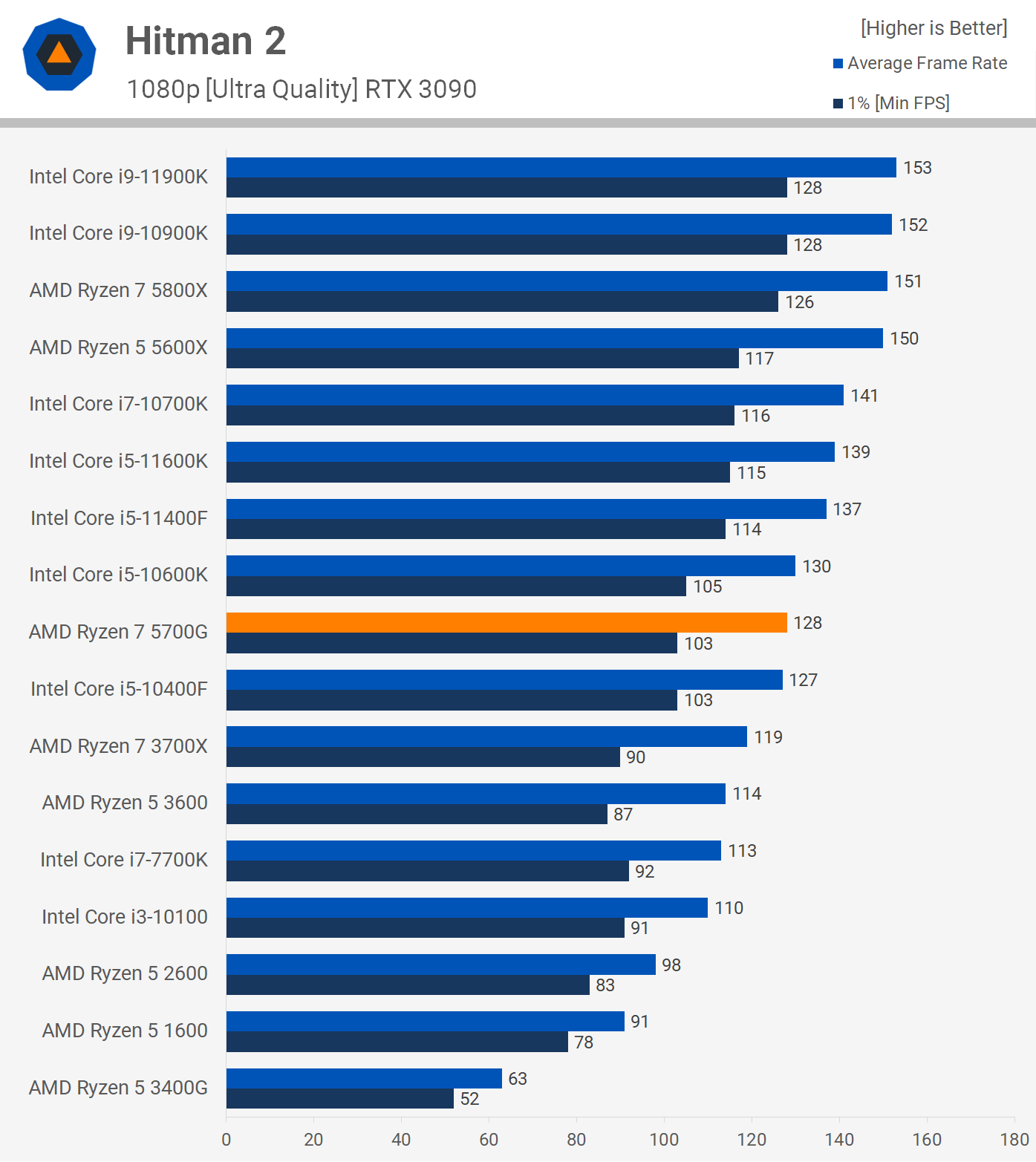
In Hitman 2, the 5700G was a lot slower than the 5800X again, this time trailing by a 15% margin. This dropped it down to the Core i5-10600K level, though it was 8% faster than the 3700X.
Average Performance
When it comes to more CPU limited gaming with a discrete GPU, the Ryzen 7 5700G isn't amazing, and it appears as though having all the cores crammed into a single die doesn't help, rather cache capacity plays a much more vital role.
That doesn't mean performance is bad and it's the best we've seen from an AMD APU so far. The 5700G is a powerful CPU that was able to match the gaming performance of Core i5-10600K and I think most will agree, that's a pretty great gaming CPU.
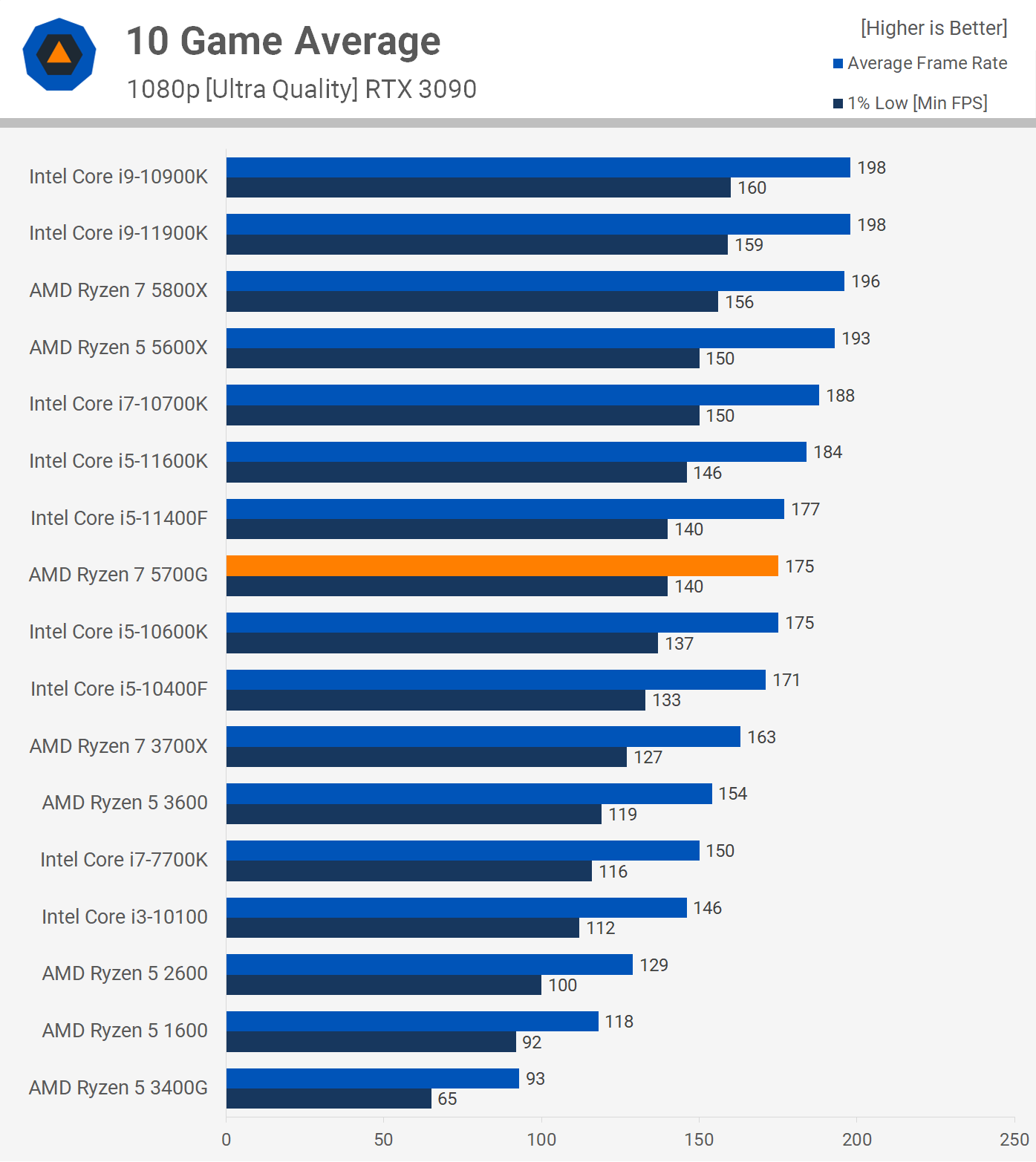
When compared to the 3400G, we're looking at a massive 88% increase in gaming performance although the new Zen 3-based APU is much more expensive.
If you were expecting 5800X-levels of performance, you might be a bit disappointed to learn that on average the 5700G was 11% slower. However, do note we're using an RTX 3090 at 1080p, so those gaming at 1440p or higher, with a fast but not extreme GPU, there'll be basically no difference between these two Ryzen 7 processors.
Who Is It For?
That's how the Ryzen 7 5700G performs, now what to make of it, as in what is this APU for? Who in our audience should consider purchasing it? Typically APU recommendations have been pretty straightforward, take the Ryzen 5 3400G, for example.
At $150, it's an affordable processor and with a budget motherboard and memory combo, it was possible to piece together the entry-level platform for well under $400. Such a build was suitable for casual gaming, mostly at 720p, but it could game and was also excellent for use as a home theater PC.

The Ryzen 7 5700G though isn't suitable for budget builds. At $360 it costs roughly as much as the 3400G motherboard and memory combo. So if you're after a more premium home theater PC setup, the 5700G might be suitable depending on the configuration you're going for. Right now, we feel the most likely use case would be to use the integrated graphics of the 5700G as a stop-gap solution, make do with the Vega 8 graphics until you can buy a new graphics card at a reasonable price.
Those wishing to build a new desktop PC right now can land parts like the Ryzen 7 5800X below the MSRP, there are also loads of well priced B550 motherboards on the market, 16GB of DDR4-3200 memory can be had for well under $100, and availability of all other components is very good: cases, power supplies and storage. The only thing stopping you from building a new gaming PC today is graphics card availability and pricing, so in a way the 5700G allows you to build now, and upgrade the graphics later.
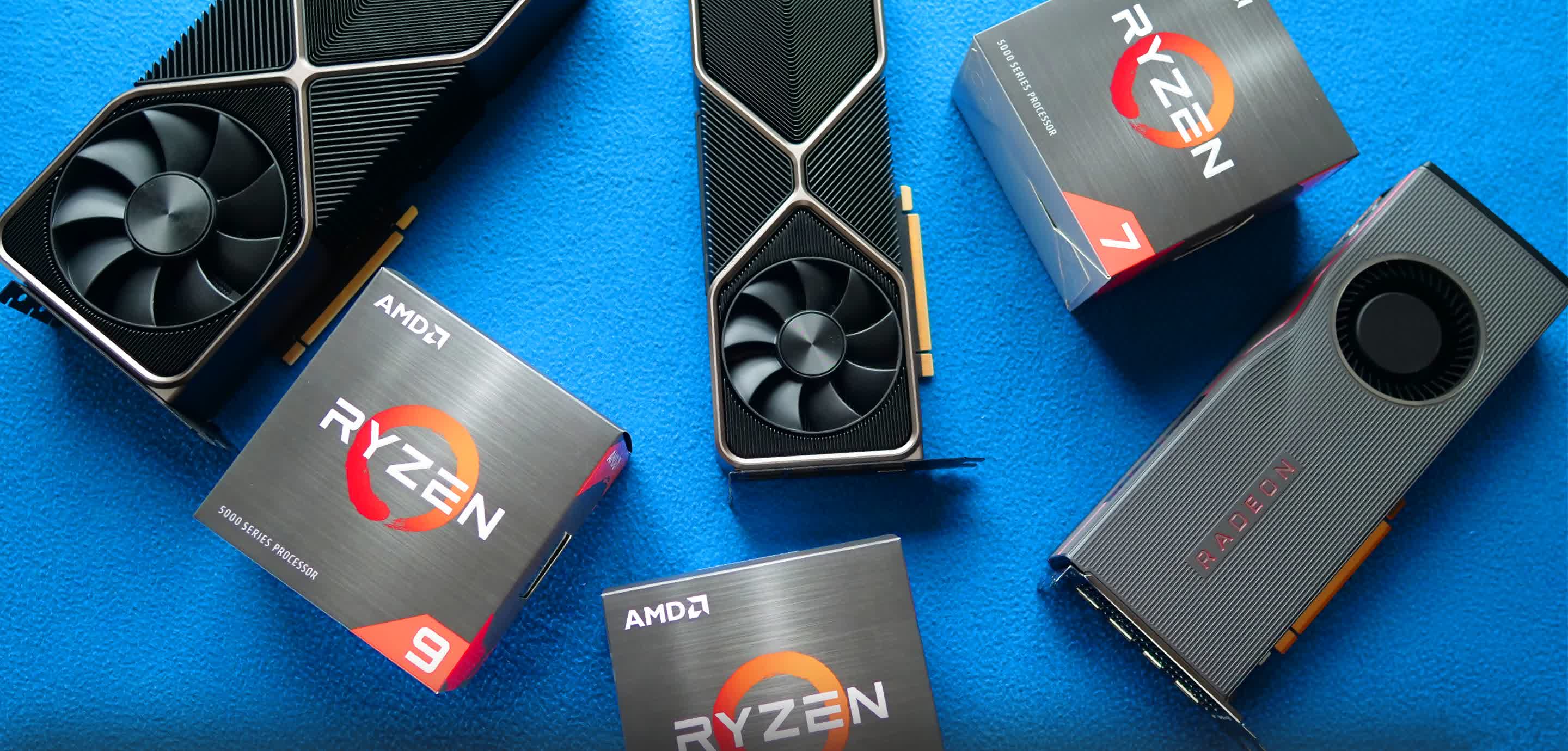
But, those focused on gaming performance will notice that the 5700G is inferior to the Ryzen 5 5600X, and yet it costs $60 more. We bring this up because for $100 you can land a GeForce GT 1030 on eBay and that will match or beat the performance of the integrated Vega 8 graphics.
And if you really care about value, then you would ignore AMD altogether and go with Intel. The Core i5-10400F can be had for just $180, affording you a $180 budget for the graphics card and we've seen used 3GB GTX 1060 cards selling for that price over the past few weeks. That will net you 100% more performance in modern games like Assassin's Creed Valhalla, and more critically, enable playable frame rates. Once you can buy a more powerful graphics card, the 10400F is basically identical to the 5700G in dGPU gaming performance anyway as we saw in our testing.
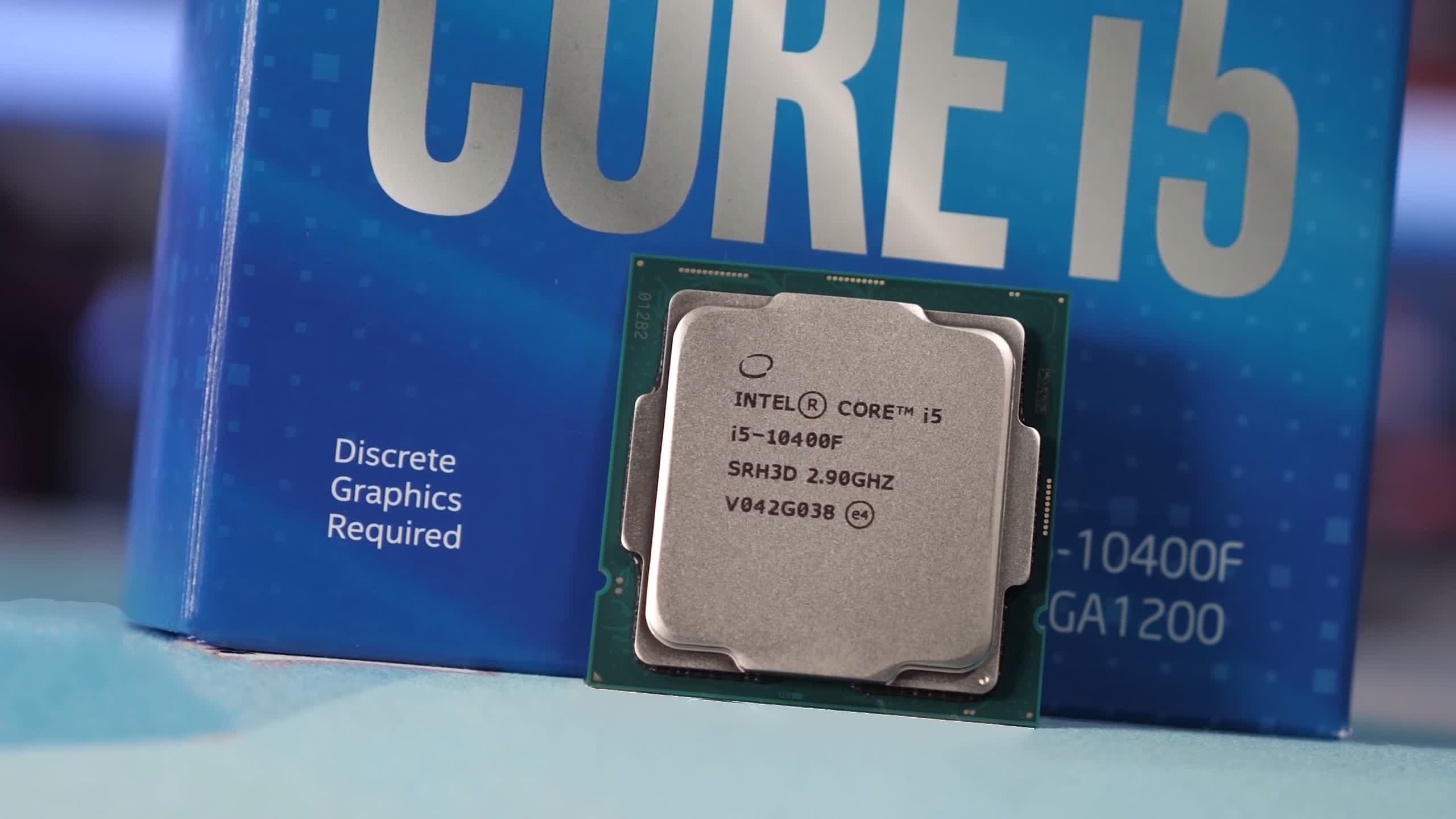
Bottom line, it's going to be rare that the Ryzen 7 5700G will ever make sense for gamers. This is an expensive Zen 3 part and in my opinion for this CPU to make sense it needs to be priced closer to $300.
